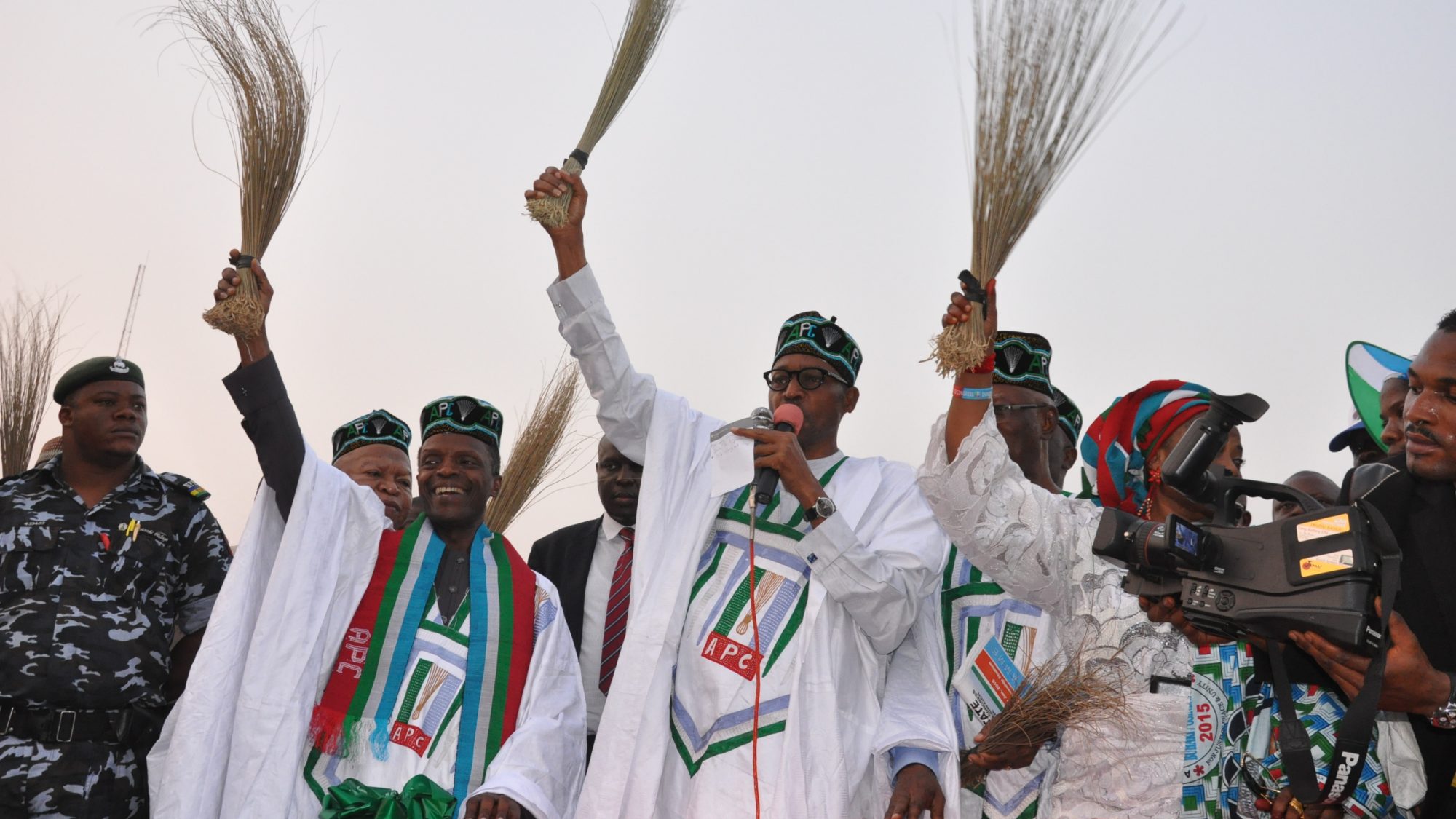

Title: The Failure of Governance in Nigeria: An Epistocratic Challenge
The failure of governance in Nigeria manifests in the declining capacity of political leaders to recognize systemic risks such as election fraud, terrorist attacks, herder-farmer conflict, armed banditry, and police brutality and put in place the necessary measures to navigate these challenges. In contrast with the current system in which leadership is attained through bribery, intimidation, and violence, Nigeria needs an epistocratic system of governance that is founded on the pedigree of its political leaders and the education of its voters.
At the end of the Cold War, African civil society movements striving for more democratic governance began to challenge authoritarian regimes on the continent. Declining living conditions within African countries and the failure of authoritarian African leaders to deliver the promises of economic prosperity they made to encourage the acceptance of development aid fueled the push for change. International donors’ insistence on democratic reform as a precondition for aid gave impetus for Nigerian civil society to push for domestic accountability. Thus, domestic pressure for political pluralism and external pressure for representative governance have both played a role in the calls for democratic reform in Nigeria.
But despite some successes, corruption and socioeconomic disparities within Nigerian democracy continue to run rampant. Since 1999, the democratic space has been dominated by political elites who consistently violate fundamental principles associated with a liberal democratic system, such as competitive elections, the rule of law, political freedom, and respect for human rights. The outcome of the 2019 presidential election further eroded public trust in the ability of the independent electoral commission to organize competitive elections unfettered by the authoritarian influences of the ruling class. This challenge is an indicator of the systemic failure in Nigeria’s governance system. A continuation of the current system will only accelerate the erosion of public trust and democratic institutions. In contrast with the current system in which votes are attained through empty promises, bribery, voter intimidation, and violence, Nigeria needs a governance system that will enhance the education of its voters and the capability of its leaders.
Statistically speaking, Nigeria has consistently ranked low in the World Governance Index in areas such as government effectiveness, political stability and the presence of violence and terrorism, rule of law, and control of corruption. Nigeria is perceived in the 2020 Transparency International Corruption Perception Index as a highly corrupt country with a score of 25/100 while its corruption ranking increased from 146 in 2019 to 149 in 2020 out of 180 countries surveyed. While President Muhammadu Buhari won the 2015 election on his promise to fight insecurity and corruption, his promises went unfulfilled; Boko Haram continues to unleash unspeakable violence on civilians while the fight against corruption is counterproductive.
At the core of Nigeria’s systemic failure is the crisis of governance, which manifests in the declining capacity of the state to cope with a range of internal political and social upheavals. There is an expectation for political leaders to recognize systemic risks such as terrorist attacks, herder-farmer conflict, and police brutality and put in place the necessary infrastructure to gather relevant data for problem solving. But the insufficiency of political savvy required to navigate the challenges that Nigeria faces has unleashed unrest across the nation and exacerbated existing tensions. The #ENDSARS Protests against police brutality in 2020 is one of the manifestations of bad governance.
The spiral of violence in northern Nigeria in which armed bandits engage in deadly planned attacks on communities, leading to widespread population displacement, has become another grave security challenge that has sharpened regional polarization. Because some public servants are usually unaware of the insecurities faced by ordinary Nigerians, they lack the frame of reference to make laws that address the priorities of citizens. The crisis of governance is accentuated by a democratic culture that accords less importance to the knowledge and competence that political leaders can bring to public office. These systemic challenges have bred an atmosphere of cynicism and mistrust between citizens and political leaders at all levels of government.
Political elites in Nigeria also exploit poverty and illiteracy to mobilize voters with food items such as rice, seasoning, and money. The rice is usually packaged strategically with the image of political candidates and the parties they represent. The assumption is that people are more likely to vote for a politician who influences them with food than one who only brings messages of hope. The practice of using food to mobilize voters is commonly described as “ stomach infrastructure ” politics. The term “stomach infrastructure” arose from the 2015 election in Ekiti state when gubernatorial candidate Ayodele Fayosi mobilized voters with food items and defeated his opponent Kayode Fayemi. It is undeniable that Nigerian political culture rewards incompetent leaders over reform-minded leaders who demonstrate the intellectualism and problem-solving capabilities needed to adequately address systemic issues of poverty and inequality.
Jason Brennan describes the practice of incentivizing people to be irrational and ignorant with their votes as the unintended consequence of democracy. Brennan believes specific expertise is required to tackle socio-economic issues, so political power should be apportioned based on expert knowledge. As Brennan suggests, Nigeria lacks a system of governance in which leadership is based on capability. Rather, the political system in Nigeria is dominated by individuals who gain power through nepotism rather than competence, influence voters with food rather than vision, and consolidate power through intimidation or by incentivizing constituents with material gifts which they frame as “empowerment” to keep them subservient and loyal political followers. By implication, the failure of governance in Nigeria is arguably the result of incompetent leadership.
Nigeria needs a new model of governance in which political leadership is based on the knowledge and competence of both political leaders and the electorate. One solution is to establish what Brennan refers to as epistocracy , which is a system of governance in which the votes of politically informed citizens should count more than the less informed. For J ustin Klocksiem , epistocracy represents a political system in which political power rests exclusively on highly educated citizens. This idea drew its philosophical influence from John Stuart Mill , who believed that the eligibility to vote should be accorded to individuals who satisfy certain educational criteria. The notion that educational attainment should be the prerequisite for the electorate to choose their leaders as proposed by Brennan, Klocksiem, and Mill is an important proposition that should be taken seriously.
However, one cannot ignore that such thinking originates from societies where civic education is high and the electorate can make informed choices about leadership. In Nigeria, the majority of citizens are uneducated on political issues. Simultaneously, those who are highly educated are increasingly becoming indifferent to political participation; they have lost faith in the power of their votes and the integrity of the political system. For an epistocratic system to work in Nigeria, there must be significant improvements in literacy levels so that citizens are educated about the issues and can use their knowledge to make informed decisions about Nigeria’s political future.
It is important to mention that Nigeria’s political elites have exploited illiteracy to reinforce ethnic, religious, and political divisions between groups that impede democratic ideals. Since the resultant effect of epistocracy is to instill knowledge, raise consciousness and self-awareness within a polity anchored on the failed system of democracy, decisions that promote the education of uninformed voters are the rationale for an epistocratic system of governance. The Constitution must ensure that only citizens who can formulate policies and make informed decisions in the public’s best interest can run for public office. When the Constitution dictates the standard of epistocratic governance, informed citizens will be better equipped to champion political leadership or determine the qualifications of their leaders. Epistocratic governance will be the alternative to Nigeria’s current dysfunctional democratic system while retaining the aspects of liberal democracy that maintain checks and balances.
We are not, however, oblivious that implementing such an epistocratic system of governance in Nigeria potentially contributes to more inequality given its highly undemocratic and exclusive nature. Our argument takes into consideration the contextual realities of poverty and illiteracy and the realization that poor and illiterate constituents have less power to evaluate the credibility of public servants or hold them accountable. The benefits of electing epistocratic leaders are that many citizens would desire to be educated in preparation for leadership. The more educated the population the more likely it is that political leaders will be held accountable. However, the kind of education that is needed to significantly transform the governance landscape in Nigeria is civic education.
We propose three policies to promote epistocratic governance in Nigeria. First, aspiring leaders must demonstrate the intellectual pedigree to translate knowledge into effective, transparent, and accountable governance that leads to national prosperity. As Rotimi Fawole notes, the bar should be higher for those aspiring to executive or legislative office “to improve the ideas that are put forward and the intellectual rigor applied to the discussions that underpin our statehood.”
Second, the government must increase access to education through government-sponsored initiatives that integrate civic education into school curriculums. Currently, little opportunity exists for young Nigerians, particularly those in underfunded public education systems, to learn about their civic roles at the local, state, national, and international levels, including how to emerge as participating citizens through the academic curriculum.
Third, the government should engage the support of local NGOs to promote civic education across Nigeria in culturally appropriate ways. The NGOs should be empowered to define the legal concept of citizenship and summarize specific civil rights enshrined in the Constitution into a Charter of Rights and Responsibilities modeled after the Canadian Charter. The Charter should include value positions essential to an effective democracy, such as the rights of citizens, social justice, accountable governance, and rule of law. It can then be commissioned as a resource for civics education in Nigeria.
This article recognizes that Nigeria is grappling with governance challenges orchestrated by two decades of a failed democratic project. Governing these challenges requires knowledgeable leaders and an equally informed electorate. Like any new experiment, there are concerns about the viability of epistocracy as a political system, particularly in a Nigerian context fraught with ethnoreligious and political challenges. But Nigeria will only have effective governance when the right people are saddled with the responsibility to govern. However, change cannot be spontaneous. The implementation of an epistocratic system of governance within the Nigerian context must be incremental, bearing in mind that Nigeria’s democracy is still evolving.
Obasesam Okoi is Assistant Professor of Justice and Peace Studies at the University of St. Thomas , Minnesota, where he teaches Intro to Justice and Peace Studies, Public Policy Analysis and Advocacy, and Social Policy in a Changing World. His research interests and expertise include governance and peacebuilding, insurgency and counterinsurgency, assessment of post-conflict peacebuilding programs and policies, and peace engineering. He has published in prominent peer-reviewed journals such as World Development, Conflict Resolution Quarterly, African Security, and Peace Review.
MaryAnne Iwara is a Senior Jennings Randolph Fellow in the program on Countering Violent Extremism at the United States Institute of Peace (USIP), USA, and a Senior Research Fellow at the Institute of Peace and Conflict Resolution (IPCR), Ministry of Foreign Affairs, Nigeria. Very recently, she was a Policy Leader Fellow at the School of Transnational Governance, European University Institute, Florence, Italy. She is currently a PhD student at the University of Leipzig, Germany.
Image Credit: Heinrich-Böll-Stiftung (via Creative Commons)
- Civil Society ,
- Regimes & Governance
Recommended Articles
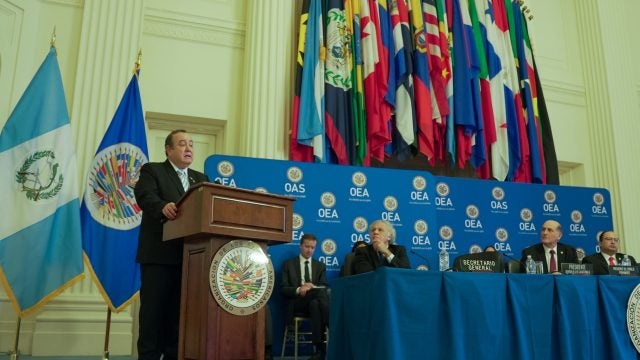
Inflection Points: Pax Americana at a Crossroad
For many in the Global South, the ‘American Peace’ or Pax Americana is a mirage amid a world of war, economic hardship, forced migration, environmental calamity, and political repression while…
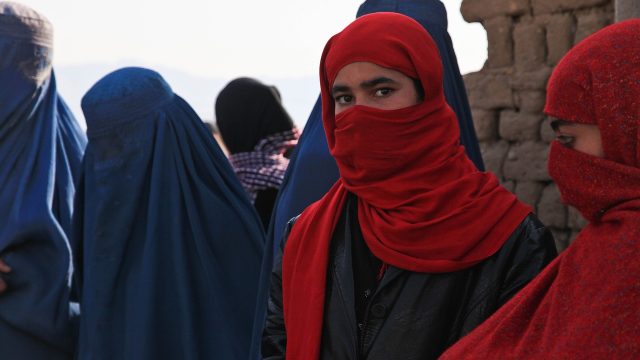
Doha Conference and Perspectives on UN Peace Efforts for Afghanistan
The United Nations is scheduled to host its third meeting of international envoys to Afghanistan in Doha on June 30, 2024. This meeting aims to discuss and address significant…

What Can Indonesia Learn from Qatar’s Experience in Mediating Conflicts in the Middle East?
Qatar plays a crucial role in mediating conflicts in the Middle East region. Its engagement in negotiations with diverse stakeholders–including countries like Lebanon, Sudan, and Libya and non-state actors such…
United States Institute of Peace
Home ▶ Publications
The Current Situation in Nigeria
A USIP Fact Sheet
Monday, April 22, 2024
/ READ TIME: 4 minutes
As Africa’s most populous country, largest economy and most notable democracy, Nigeria is a bellwether for the continent. A weakening economy and rising insecurity threaten progress made in its democratic development. Amid deepening distrust in government and institutions, Nigeria has significant work to do in improving national, state and local security and governance following the national and state elections in 2023.
USIP's Work
USIP leverages its on-the-ground access to partners and stakeholders in Nigeria to strengthen capacity and networks invested in peacebuilding. Through its office and expert staff in Abuja, USIP supports in-country initiatives such as the Nigeria Working Group, the Network of Nigerian Facilitators, and a range of capacity-strengthening engagements with state-level peacebuilding institutions. These initiatives are designed to help address localized conflicts that exacerbate entrenched grievances, undermine public faith in government institutions, and risk escalation to large-scale conflict. USIP also convenes state governors, national policymakers and civic leaders to develop inclusive approaches on conflict prevention and community-oriented security programs. Recent work includes:
Nigeria Working Group on Peacebuilding and Governance
In 2016, USIP established the Nigeria Working Group on Peacebuilding and Governance — comprised of former senior policymakers, senior military officers, academics, and traditional and religious leaders — to ensure a diverse array of voices influence decision-making processes in Nigeria. The working group fosters relationships between citizens, policymakers, and national and international figures to turn localized expert analysis into tangible, actionable policy options that are presented at Nigerian decision makers’ request. Ahead of the 2023 elections, the working group organized a six-episode television program highlighting citizens’ perspectives on key issues in the election that aired over 30 million viewers throughout Nigeria. The working group is regularly invited by state and national policymakers to provide recommendations on a range of issues, from inclusive governance , regional dynamics and electoral violence to communal conflicts between pastoralists and farming communities.
Network of Nigerian Facilitators (NNF)
The NNF is a group of professional peace mediators trained by USIP to resolve local conflicts through nonviolent means across 11 states. NNF dialogues focus on strengthening community-security relationships and mitigating intercommunal, pastoralist-farmer and election-related violence. Since 2019, the NNF has collaborated with state peacebuilding institutions to address conflicts and support local peace processes.
Strengthening State Governments and Peacebuilding Institutions
Nigeria’s federal system bestows governors with the responsibility of addressing the issues driving the country’s multiple conflicts, including intercommunal violence, deepening regional divides, armed banditry and terrorism. USIP supports governors and state peacebuilding institutions in establishing inclusive, cooperative strategies to prevent and resolve violent conflicts and aligning policies with citizens’ needs surrounding governance and human security.
Resilient and Responsive Local Security Approaches
Through USIP’s ongoing Justice and Security Dialogue project, citizens at the local level work together to identify security challenges specific to their communities. With USIP’s support, community members organize dialogues that bring together internally displaced communities and local police to develop practical and concrete solutions that build trust, foster accountability and preserve local agency.
Providing Security Policy Options to Nigerian Policymakers
USIP conducts research on governance and security to inform Nigerian policymakers’ responses to growing challenges in a complex regional environment. USIP has published research mapping state peacebuilding institutions ; assessing election-related violence risks ; and outlining pathways to civilian-led governance amid the Boko Haram insurgency in northeast Nigeria.
Convening U.S. and Nigerian Senior Policymakers
USIP fosters stronger ties and collaboration between U.S. and Nigeran senior policymakers by convening government officials, partners and civic leaders at its Washington headquarters and its Nigeria country office for candid and productive conversations that inform USIP’s program priorities. USIP hosted then-President Muhammadu Buhari in 2022, the Buhari-Tinubu presidential transition team in 2023, and President Tinubu’s national security advisor Nuhu Ribadu in 2024. In 2024, USIP will convene governors from Katsina, Zamfara, Kaduna, Niger, Sokoto, Kebbi, Benue and Plateau states for another high-level symposium in Washington that allows U.S. stakeholders to work directly with “front-line” governors to develop inclusive strategies for addressing the drivers of conflict and insecurity in northern Nigeria.
Expanding the Institute’s Field Work
In 2020, USIP established a country office in Abuja to deepen its operations with credible partners and stakeholders based in the region and sustain its direct action for peace in Nigeria.
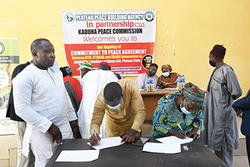
In 2023, the Network of Nigerian Facilitators (NNF) helped the Kaduna State peacebuilding institutions negotiate, draft and implement a peace agreement between local groups to resolve a long-standing and violent communal conflict. The agreement built on a 2019 peace agreement also supported by the NNF to resolve a cross-border conflict involving many of the same groups in neighboring Plateau State.
The views expressed in this publication are those of the author(s).
PUBLICATION TYPE: Fact Sheet
Top 9 Causes of Insecurity in Nigeria and Solutions
- Post author: Edeh Samuel Chukwuemeka ACMC
- Post published: June 9, 2024
- Post category: Scholarly Articles
Causes and Solutions to Insecurity in Nigeria: The insecurity in Nigeria is increasing exponentially with each passing day. Insecurity and terrorism have been a major challenge for the Nigerian government lately, each of which leads to the loss of life and the destruction of properties.
As a result, insecurity has taken different forms in several parts of the country, amed robbers have taken position within the south-west, cross-border bandits operate smoothly in the north, while kidnapping issues are widespread in the south-south. In Nigeria, insecurity is supported by corruption and corrupt people in different sectors.
Nigeria is among the world most terrorist countries. The rate at which evil is growing in Nigeria and the ruthless manner in which the lives of innocent people is being wasted are worrying. Citizens are burdened daily with emotional and psychological trauma as a result of the death of their loved ones who had fallen victims. In this article we shall discuss the possible solutions to the problem of insecurity in Nigeria.

Recommended: Causes, Effects and Solutions to Bad Leadership in Nigeria
Table of Contents
Top 9 Major Causes of Insecurity in Nigeria
1. Bad Governance : The increasing incidents of violent attacks are symptoms of weak, marginal or exploitative government systems in Nigeria. The government’s inability to provide public services and meet the basic needs of the masses has created a group of frustrated people who are easily classified as violent by any event.

2. Poverty: The failure of Nigerian governments to fix the challenges of poverty and the unequal distribution of wealth among ethnic nationalities is a major contributor to the country’s insecurity. When you have a poor population, you have a serious insecurity problem.
Recommended: Causes, Effects and Solutions to Conflict in Africa
3. Terrorism / kidnapping : Terrorism is the use of violent acts to achieve political goals or to force a government to act. Boko Haram is the most famous terrorist organization that has done the most damage to the country. Nigeria has lost many lives in the northern region to the Boko Haram uprising, that devastated the northern region of the country.
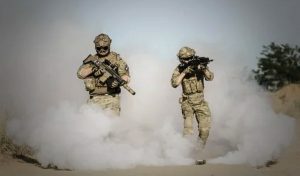
Other acts of terrorism include suicide bombings, assassinations, and kidnapping. Terrorist activities have resulted in displacement of people, loss of life and property, distrust, anger and hatred, as well as psychological and emotional trauma and general insecurity.
4. Weak judicial system: The weakness of the Nigerian judiciary system creates uncertainty in Nigeria. People feel insecure when criminals are released. Many criminals have bought their freedom with money in the country, the legal system has abandoned its people and released all kinds of atrocities.

Also see: Most corrupt countries in Africa 2024
5. Corruption : Corruption is already a part of life in the country and, unfortunately, is now part of Nigeria’s economic problems, and public appropriation. It has gained popularity in our system of government.
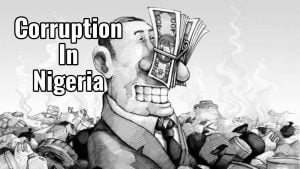
This creates financial insecurity which has exacerbated poverty, there is corruption in public office at all levels and this has created a lot of instability in our country.
6. Unemployment: According to statistics, a tenth of the country’s young citizens are officially unemployed. Young people are overwhelmed by the high unemployment rate in Nigeria. Every year, universities make many graduates who were unfortunately thrown onto the job market with no prospect of job opportunities.
And this has lead a lot into criminal acts. Unfortunately, due to bad government decisions, our factories are still not reactivating. Due to the unemployment among Nigerians, young people are now negatively attracted to violent crime.
Recommended: Advantages and Disadvantages of a written constitution
7. Poor Security System: This is due to inadequate government security equipment in both weapons and training. It contributes to the poor disposition of the security personnel. In many cases, security officers tasked with certain security situations lack the experience and equipment to handle situations so that they will not arise.

8. Porous Border : Nigeria shares borders with Niger, Burkina Faso, and Mali. These borders are poorly secured by the Nigerian immigration and customs authorities. The porous nature of these borders has exacerbated the possible spread of terrorist activity in Nigeria. With terrorism in the country there will be no room for adequate development in our country.
9. Ethnic Groups and Religious Differences: It should be remembered that the country’s diverse ethnic makeup is not in itself a cause of insecurity in Nigeria.
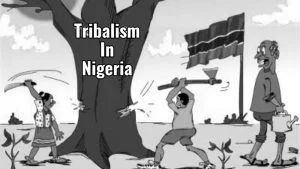
However, political and religious leaders across the country sometimes use ethnic sentiments to pursue their selfish ambitions, create mistrust and resentment between different ethnic groups and religions.
Recommended: Brain drain causes, Effects and Solutions in Nigeria
Solution to insecurity in Nigeria
1. Solidified border security: The federal government must face the immediate challenge of boundary porosity. The government should make concerted efforts to recruit, train and deploy adequately equipped customs and immigration personnel across borders. The government needs to invest in more effective security technologies, which will benefit border security.

These technologies can include body cameras, smart license plate readers, smart vehicle underbody scanners, and more. Border guards, serving to secure the border, must have adequate access to these types of resources that enable them to do their jobs effectively.
2. Human and Infrastructure Development: We need to capitalize on demographic dividends by investing in health, education and livelihoods, especially for our young people. There is urgent need to draw a national development plan that require the three levels of government. There should be development projects in important sectors of national life all at the same time.
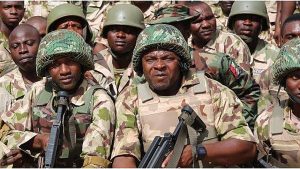
The authorities must additionally increase people’s dwelling requirements with the aid of setting up greater facilities of entrepreneurship throughout the nation.
Also see: Examination malpractice causes, Effects and Solutions in Nigeria
3. Leadership development : Nigeria must develop visionary leadership. Leadership positions should be for people who can convey to their people the idea of a common citizenship as a transcendent factor among all Nigerians, regardless of tribe, gender, religion, economic and social status that focuses on facts and pronouncements that will convincingly and positively affect all citizens of our nation.
The process of developing such leadership can be challenging, but our country desperately needs leaders with a national perspective and an eagerness to change the nation.
4. Good Governance: Good governance is the panacea to Nigeria’s insecurity challenge. Good governance is required, in which the government is accountable and accountable to the people. Good governance is a function of effectiveness, foresight, transparency, reliability and credible political leadership, the driving force of which is the improvement of the collective well-being of citizens through well-designed and effectively implemented economic policies and human development programs. The focus on people as the primary goal of governance. It is time to give up negative behavior and bad political tactics so that the country can have peace.
Also see: Monthly and Annual salary of the Nigerian Police Force
5. Economic Development : The country’s economic productivity and opportunities for its citizens need to be improved. The challenge of insecurity in Nigeria can be solved by accelerating development in our country.
Development in this context is about creating an economy with societal relevance, an economic and physical infrastructure for business activity and industrial growth, in order to create gainful employment, high-quality educational facilities and health care for the people.
6. Elimination of Corruption: It is the cause of inequality and the unequal distribution of the wealth of nations among their citizens. Corruption at all levels must be eliminated in such a way that equal rights apply to all and rights and privileges of people are not agreed upon based on bribery and tribe but on merit, defined in relation to theirs Character content, their mental efficiency and their efficiency; where there will be no discrimination.

Also see: Cost of building a duplex in Nigeria explained
7. Building a proactive law enforcement agency : There is a need to collect and monitor information so that law enforcement officers can be proactive and predict potential crimes with near perfect accuracy and not reactively. Government at all levels cannot compromise in enforcing the law.
Law enforcement agencies must prevent and control behavior that threatens life and property, protect constitutional guarantees such as freedom of expression and assembly, resolve conflicts between individuals or between citizens and their government, and identify problems that may become more serious to individuals or authorities
7. Proper Security training and equipment: More attention needs to be paid to the security department in order to conform to worldwide standard practice and the acquisition of modern technology.
There is also a need to modernize security agencies through adequate training, advanced technology, motivation and change of direction.

Recommended: Best side hustles for students while in school
8. Appropriate Education : Education is a prerequisite for any form of development. Adequate education is the process of teaching, training and learning, especially in schools and universities, to improve knowledge and develop skills.
This is very much for national development. It is time we know that education without skills is a disservice at the highest level. It is necessary to change our curriculum and reorganize our learning institutions even from elementary to tertiary education, the government needs to include skills acquisition as a central part of the academic curriculum. It must also provide students with the necessary opportunities to learn these skills.
Also see: Why is africa underdeveloped? See Reasons
9. Improvement of the criminal justice system : The judiciary should have developed time scales for cases at this stage in our development.There should have been a time to determine a cause; Time to close this case; and time to pass judgment.
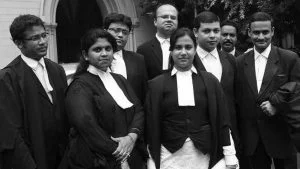
Hence, the government must ensure that criminal proceedings are successfully completed. Criminals will serve their full sentences, when convicted. Suspects are brought to justice earlier. Procedural documents must be available to lawyers and the public in digital form. Likewise, the procedure for filing a criminal complaint is to be simplified with greater consideration for the victims.
Recommended: Features of clifford constitution of 1922
Effective formulation and implementation of guidelines and programs that can address the basic causes of uncertainties in Nigeria is essential, particularly with regard to poverty; Unemployment, environmental degradation, injustice, corruption, porous borders and the proliferation of small arms.
Therefore, efforts to combat insecurity can only be effective if there is a solid combination of legislative and judicial interference with government reforms that address some serious human security challenges facing a large majority of the population.

Edeh Samuel Chukwuemeka, ACMC, is a lawyer and a certified mediator/conciliator in Nigeria. He is also a developer with knowledge in various programming languages. Samuel is determined to leverage his skills in technology, SEO, and legal practice to revolutionize the legal profession worldwide by creating web and mobile applications that simplify legal research. Sam is also passionate about educating and providing valuable information to people.
This Post Has 4 Comments
Nice one there. A solution provider for a change. Well done. Keep up the good work.
Nice piece of work. Very detailed. Keep it up
A very detailed piece, with a lasting proferred solution. Keep it up!
Nice facts it was really helpfull to my research
Comments are closed.
- Foreign Affairs
- CFR Education
- Newsletters
Climate Change
Global Climate Agreements: Successes and Failures
Backgrounder by Lindsay Maizland December 5, 2023 Renewing America
- Defense & Security
- Diplomacy & International Institutions
- Energy & Environment
- Human Rights
- Politics & Government
- Social Issues
Myanmar’s Troubled History
Backgrounder by Lindsay Maizland January 31, 2022
- Europe & Eurasia
- Global Commons
- Middle East & North Africa
- Sub-Saharan Africa
How Tobacco Laws Could Help Close the Racial Gap on Cancer
Interactive by Olivia Angelino, Thomas J. Bollyky , Elle Ruggiero and Isabella Turilli February 1, 2023 Global Health Program
- Backgrounders
- Special Projects
China’s Stockpiling and Mobilization Measures for Competition and Conflict Link
Featuring Zongyuan Zoe Liu via U.S.-China Economic and Security Review Commission June 13, 2024
- Centers & Programs
- Books & Reports
- Independent Task Force Program
- Fellowships
Oil and Petroleum Products
Academic Webinar: The Geopolitics of Oil
Webinar with Carolyn Kissane and Irina A. Faskianos April 12, 2023
- State & Local Officials
- Religion Leaders
- Local Journalists
NATO's Future: Enlarged and More European?
Virtual Event with Emma M. Ashford, Michael R. Carpenter, Camille Grand, Thomas Wright, Liana Fix and Charles A. Kupchan June 25, 2024 Europe Program
- Lectureship Series
- Webinars & Conference Calls
- Member Login
Nagging Constraints to Democratic Stability and Economic Prosperity in Nigeria
Ebenezer Obadare's testimony to the House Foreign Affairs Subcommittee on Africa addresses the current state of affairs in Nigeria and what both the Nigerian government and the United States can do to secure a brighter future for the country.
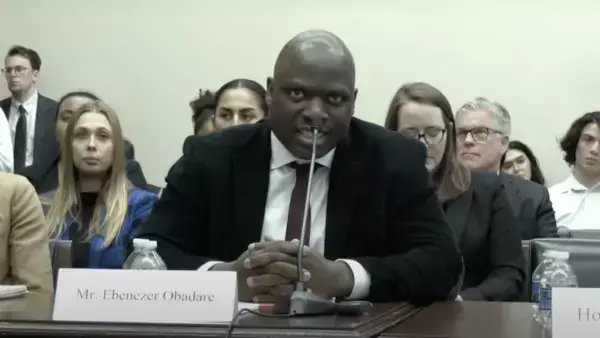
Testimony by Ebenezer Obadare
February 14, 2024
Nagging Constraints to Democratic Stability and Economic Prosperity in Nigeria
Prepared statement by Ebenezer Obadare Douglas Dillon Senior Fellow for Africa Studies Council on Foreign Relations
Before the House Foreign Affairs Subcommittee on Africa United States House of Representatives 2nd Session, 118th Congress
Hearing on “The Future of Freedom in Nigeria”
Chairman James, Ranking Member Jacobs, and members of the Subcommittee, I am grateful for the privilege of testifying before you on the subject of “The Future of Freedom in Nigeria.”
Economic Crises
Heads of State and Government
Judging by mainstream and social media commentary in recent weeks, the mood among a section of the Nigerian public has turned decidedly foul.
One does not have to search far and wide for the immediate trigger.
As President Bola Ahmed Tinubu, who took office last May following a deeply polarizing presidential election, attempts to push through a series of market-friendly measures—the most contentious being the withdrawal of official subsidy on petrol—a predictable rise in the cost of living has sent the public reeling, with newspaper headlines dominated by accounts of everyday Nigerians resorting to all manner of desperate survival measures. In one by no means atypical example, thirty-eight-year-old Chinyere Chukwu was apprehended after arranging to sell off her two sons “due to the economic hardship in the country.” The United Nations Children’s Fund (UNICEF) estimates that as many as twenty-five million Nigerians are “at high risk of food insecurity.”
For the average Nigerian, economic pain is compounded by widespread insecurity, the latter highlighted by a protracted Islamist insurgency, bandit attacks on farming communities, regular law enforcement assaults on ordinary citizens, a palpable rise in the incidence of kidnapping for ransom, and vigilante justice. The Civil Society Joint Action Group, a collection of Nigerian civil society organizations, calculates that 2,423 people have been killed and another 1,872 abducted between June 2023 and January 2024. Many killings and abductions are undocumented.
On the whole, a growing number of Nigerians appear to be souring on the Tinubu administration. The fact that protesters angered by the rising cost of living have taken to the streets in central Niger State and northwest Kano State, parts of the country not particularly renowned for their activism, would suggest that the feeling of frustration is anything but partisan.
What exactly is going on in Nigeria? Why is the country, yet again, in a state of agitation and terror, and to whom or what should the accusing finger be pointed?
It is only right that we start with the incumbent administration.
Although it came into office needing to prove a point, particularly given persistent anger at the conduct and outcome of the vote that brought it into office, the Tinubu government started off on a bright note, appearing to win over a justly skeptical public with measures and pronouncements that seemed to indicate that it had a clear idea of what to do and how to go about it.
For instance, while many may have had doubts about the inauguration day decision to remove the subsidy on petrol, the lifeblood of the Nigerian economy, the broad consensus among economists and public policy experts was that the measure was needed to curtail waste and save the government from an expenditure it could ill afford. Other measures, like the signing into law of a student loan bill, the approval of an infrastructure support fund, the declaration of a national emergency on food security, and the suspension of the excise tax on telecommunication services, signaled a refreshing boldness to put the welfare of ordinary Nigerians first.
However, the honeymoon between the new administration and Nigerians has been short-lived. One reason, as already indicated, is the government’s failure to arrest the nationwide bloodletting, repeated assurances to “overhaul the security architecture” notwithstanding. Across sixty-odd years of independence, rarely has the average Nigerian, regardless of location, felt more insecure and vulnerable. A second reason is the persistent gloom on the economic front, prompting a growing number of multinationals to shut down manufacturing in the country. Furthermore, reports of political graft involving ministers and other appointees of the administration have convinced Nigerians that it is likely to be business as usual.
If only because of this, the Tinubu administration deserves all the indignation and criticism directed at it. Not only has it failed to take advantage of abundant Nigerian expertise at home and across its far-flung diaspora, but increasingly, many of its decisions seem motivated by a desire for political gratification. Furthermore, for an administration always quick to remind Nigerians that the country is broke, it is puzzling that Tinubu approved a revised budget in which millions of dollars were appropriated for automobiles for members of the national assembly and “renovation” of the official residences of the president and vice president respectively. The disconnect between its rhetoric and its actions is another reason for public indignation at the Tinubu administration.
Nonetheless, we should resist the temptation to put all the blame for Nigeria’s woes on Tinubu’s shoulders. If anything, the Subcommittee must understand that the rot in Nigeria runs deep, going beyond the well documented malfeasances of a single administration. Indeed, the current administration is nothing more than a continuation of its predecessors, insofar as it exhibits traits that have largely defined Nigerian political culture since independence, becoming more entrenched during the military era.
I am not alone in arguing that the most consequential among these traits, and one worth emphasizing if only because it is the hub of everything that ails Nigeria as a country, is rampant corruption. It is no exaggeration to say that no progress is possible regarding security or creating an attractive economic environment for (domestic or foreign) investment without a concerted effort at tackling corruption in Nigeria. Its corrosive effects on institutions and public morale are too well-known to be recapitulated here. For this reason, I would suggest the Subcommittee take seriously the nagging problem of corruption in Nigeria, with a view to increasing material and moral assistance to entities and agencies currently involved in the challenging task of rooting it out.
As a corollary, the Subcommittee should take seriously ongoing agitation by Nigerians both within and outside the country for urgent judicial reforms. Following last year’s general election, the perception that “justice” is only available to the highest bidder and that the political game is rigged has intensified, leading to increased scrutiny of the judiciary. Since there is no rule of law, never mind freedom, without an impartial judiciary, it is crucially important that the Subcommittee recognize and respond to Nigerians’ yearning for a fair-minded judiciary.
Beyond the judiciary, the Nigerian state is in dire need of reform. As it is, it is nothing more than a shell of a state, a vast prebendal network held hostage by a larcenous elite. As I have noted elsewhere, it is a state that has proved adept at what it should not do and utterly feckless at what it ought to.
If the Nigerian situation is so daunting, why should you care?
Despite its problems, Nigeria is a supremely vibrant country, one with the potential to become the United States’ most important African political ally and trading partner. In their imagination, Nigerians already see the United States as a model of what their country can become if only it can get out of its own way—a prosperous multi-ethnic state founded on the ethos of individual liberty. From this standpoint, the well-documented success of Nigerian immigrants in the United States is hardly surprising.
Furthermore, Nigeria plays a key leadership role in the West African sub-region and on the African continent. In West Africa, it is the undoubted anchor of regional political stability and, accounting for 67 percent of its GDP, the sub-region’s economic engine. Across Africa, Nigeria is widely respected for its cultural clout and energy.
At this critical juncture, Nigeria needs the help of the United States to keep its best talents from leaving, reform the state, make the environment safe for investment, improve security, and expand the horizons of individual liberty.
Once again, I am grateful for the opportunity to address you today, and I look forward to answering your questions.
About Ebenezer Obadare
Dr. Ebenezer Obadare is the Douglas Dillon Senior Fellow for Africa Studies at the Council on Foreign Relations.
Explore More on Nigeria
Nigeria Security Tracker
Tracker by Michelle Gavin July 1, 2023 Africa Program
Nigeria Security Tracker Weekly Update: June 17-23
Blog Post by CFR Africa Program June 27, 2023 Africa in Transition
Nigeria Security Tracker Weekly Update: June 10-16
Blog Post by CFR Africa Program June 23, 2023 Africa in Transition
Top Stories on CFR
How Japan Is Viewing the North Korea-Russia Alliance
Expert Brief by Sheila A. Smith June 27, 2024 Asia Program
Visiting Israel, June 2024
Blog Post by Elliott Abrams July 1, 2024 Pressure Points
United States
The 2024 Candidates on Foreign Policy
June 26, 2007
Causes and Implications of Worsening Insecurity in Nigeria: Developing a Cure Through the Law
- First Online: 01 January 2023
Cite this chapter

- Nicholas O. Agbo 5
233 Accesses
Nigeria is presently enmeshed in a rising insecurity of unimaginable dimension. On April 26, 2021 Boko Haram killed 30 Nigerian soldiers in Sokoto. Several terror groups ranging from Boko Haram, Fulani herdsmen, bandits, jihadist, kidnappers, etc., now waste human life more easier than one can waste a mere animal. The entire Nigerian citizenry now literally sleep with two eyes open, emasculated by the fear of these terror groups and the pains and destruction they are capable of unleashing on innocent law-abiding citizens. In the wake of all these, the economy has receded deep into the wood as the national legal tender continues its astronomical downward plunge. This paper seeks to interrogate the sources, and implication of the rising state of insecurity in the nation with a view to finding possible solutions through law. The key recommendations of the paper will be an immediate return to true federalism, strict adherence to the rule of law, vigorous enforcement of the financial crimes laws as well as enacting more efficacious one such as the Unexplained Wealth Orders as a tool for reviving the dead war against corruption, immediate enactment of a law to establish State Police, codification of moral values and ethics and embarking upon moral rearmament of the citizenry, redressing of obvious past and present wrongs and placement of merit over mediocrity.
This is a preview of subscription content, log in via an institution to check access.
Access this chapter
Subscribe and save.
- Get 10 units per month
- Download Article/Chapter or Ebook
- 1 Unit = 1 Article or 1 Chapter
- Cancel anytime
- Available as PDF
- Read on any device
- Instant download
- Own it forever
- Available as EPUB and PDF
- Compact, lightweight edition
- Dispatched in 3 to 5 business days
- Free shipping worldwide - see info
- Durable hardcover edition
Tax calculation will be finalised at checkout
Purchases are for personal use only
Institutional subscriptions
Similar content being viewed by others

Securing the Insecure: An Insight into Human Security in Myanmar

Dimensions and Manifestations of Spiritual Threats and Insecurity in Contemporary Nigeria

‘México en llamas’: Political Utopia and ‘taking justice into one’s own hands’ in Times of War
CFR1999, Section 14(2)(b).
Mohamed Babangida, ‘Gumi Warns Buhari against declaring Bandits Terrorist’ Premium Time: https://www.premiumtimesng.com/news/headlines/491666-gumi-warns-buhari-against-declaring-bandits-as-terrorists.html . Accessed November 6, 2021.
Top Ten Terrorist Countries, Terrorism index 2020 https://www.visionofhumanity.org/global-terrorism-index-2020-the-ten-countries-most-impacted-by-terrorism/ . Accessed November 5, 2021.
Tope Templer Olaiya, Nigeria ranks 146th on Global Peace Index, 8th least peaceful in Africa. https://guardian.ng/news/nigeria/nigeria-ranks-146th-on-global-peace-index-8th-least-peaceful-in-africa/ .
Kunle Aderinokun, ‘Diaspora Remittances Hit $34bn as Nigerian Migrant Workers Top List’.
https://www.thisdaylive.com/index.php/2021/08/29/diaspora-remittances-hit-34bn-as-nigerian-migrant-workers-top-list/ . Accessed November 6, 2021.
Onyebgula, S. Democracy in Nigeria: A critical overview of the Journey sofa. CDD News Quarterly Journal of the Center for Democracy and Development.
New Webster’s Dictionary and Thesaurus of the English Language, lexicon publications Inc., Revised and updated 1992. Danbury, Ct.
Muyiwa, F. et al., ‘Social Contract Theories And Governance In Contemporary Nigeria’ (2016). https://www.researchgate.net/publication/308477261_SOCIAL_CONTRACT_THEORIES_AND_GOVERNANCE_IN_CONTEMPORARY_N .
Ndubuisi-Okolo P, ‘Insecurity in Nigeria: the implication for industrialization and Sustainable Development’ (2019)5(6)7.
Beland, D. (2005). The Political Construction of Collective Insecurity: From Moral Panic to Blame Avoidance and Organized Irresponsibility. Center for European Studies Working Paper Series 126.
I.C. Achumba et al., ‘Security challenges in Nigeria and the implications for Business Activities and Sustainable Development’, Journal of Economics and Sustainable Development, Vo. 4. No. 2.
CFRN 1999 Section 14(b).
Peter Duru, ‘Nigerian is fast becoming a failed state’ Vanguard News: https://www.vanguardngr.com/2021/07/nigeria-fast-becoming-a-failed-state-under-apc-ortom/ . Accessed November 6, 2021.
Sylvanus Viashima, ‘Nigeria is fast becoming a failed state’Sun Newspapers: https://www.sunnewsonline.com/nigeria-fast-becoming-a-failed-state-governor-ishaku/ . Accessed November 6, 2021.
More than 30 Nigerian Soldiers Killed in Militant Attack: https://www.voanews.com/a/africa_sources-more-30-nigerian-soldiers-killed-militant-attack/6205065.html . Accessed November 7, 2021.
Chris Ewokor, ‘Nigerian military jet shot down by Bandits-Military’ (2021) BBC News https://www.bbc.com/news/world-africa-57893662 . Accessed November 7, 2021.
Transparency International, ‘What is Corruption? https://www.transparency.org/en/what-is-corruption# .
Confort O. et al., ‘Addressing the Insecurity Challenge in Nigeria: The imperative of Moral Values and Virtue Ethics’(2013) 2(13) Global Journal of Human Social Science Political Science. https://core.ac.uk/download/pdf/16701001.pdf . Accessed November 7, 2021.
Council on Foreign Relations, ‘Perception of Corruption in Nigeria remain high according to NGO’ (2020). https://www.cfr.org/blog/perceptions-corruption-nigeria-remain-high-according-ngo . Accessed November 6, 2021.
CFRN, 1999.
Identifying essential elements of Democracy: https://int.nyt.com/data/documenthelper/476-identifying-essential-elements/fdb7620f42a7c76af5f2/optimized/full.pdf . Accessed November 6, 2021.
Humphrey Nwosu, ‘ Laying the foundation for Nigeria’s Democracy: My Account of the June 12, 1993 Presidential Election and its Annulment’ (2017) New York: Page Publishing Inc. 240.
Id n8 at p. 23.
The case for State Police, Thisdayliveonline: https://www.thisdaylive.com/index.php/2020/12/24/the-case-for-state-police/ . Accessed November 7, 2021.
Tunde Ajala, ‘Nigerian Endless Security Challenges’ Punch Newspaper: https://punchng.com/porous-borders-nigerias-endless-security-dilemma/ . Accessed November 7, 2021.
Citizenship Rights in Africa Initiative, ‘Nigeria: Bauchi State Governor on Stateless Fulani: https://citizenshiprightsafrica.org/nigeria-bauchi-governor-on-the-stateless-fulani/ . Accessed November 7, 2021.
Country Report on Human Rights Practices: Nigeria: https://www.state.gov/reports/2020-country-reports-on-human-rights-practices/nigeria/ . Accessed November 7, 2021.
Chris I. Nwagboso, ‘Security Challenges and Economy of the Nigerian State (2007–2011)’, American Journal of Contemporary Research, Vol. 2 No.6 2012.
Financial Africa, ‘Ten economic consequences of growing insecurity in Nigeria’: Ten economic consequences of growing insecurity in Nigeria: http://www.financialnigeria.com/ten-economic-consequences-of-growing-insecurity-in-nigeria-blog-512.html . Accessed November 7, 2021.
EFCC eventually uncovered how the said $2.1b was shared out as bribes to matters unrelated to security. The then National Security Adviser, Colonel Sambo Dasuki, who had custody of the money was eventually arrested along with many other suspects.
It is sad to recall that in 1973 the Naira was exchanging at N1-$62 but today it the naira exchanges for N579-$1. See the Decline and fall of the Naira in Vanguard news of August 9, 2021.
Comfort et al., ‘Addressing the Insecurity Challenge in Nigeria: The imperative of Moral Values and Virtue Ethics’(2013) 2(13)Global Journal of Human Social Science Political Science https://core.ac.uk/download/pdf/16701001.pdf . Accessed November 8, 2021.
Robert Bates, ‘When Things Fell Apart: State Failure in Late Century Africa’(2008) (Cambridge: Cambridge University Press).
Id Bauchi and Benue.
Independ Corrupt Practices & Other Related Offences Commission Act, 2000.
EFCC Section 6(c).
ICPC ss 27–42; s54, 61.
Onifade C. et al., ‘Addressing the Insecurity Challenge in Nigeria: The imperative of Moral Values and Virtues Ethics (2013) 2(13). https://core.ac.uk/download/pdf/16701001.pdf .
Transparency International Uk, ‘Unexplained Wealth Orders-a brief guide’. https://www.transparency.org.uk/unexplained-wealth-orders-brief-guide .
Onifade C. et al., ‘Addressing the Insecurity Challenge in Nigeria: The imperative of Moral Values and Virtues Ethics(2013) 2(13). https://core.ac.uk/download/pdf/16701001.pdf .
Sunday N, ‘Once you join APC your sins are forgiven’(2019). Vanguard. https://www.vanguardngr.com/2019/01/once-you-join-apc-your-sins-are-forgiven-oshiomhole-says-as-ph-lambasts-him/ . Accessed November 8, 2021.
Eromo Egbejule,‘The West African Nation that lasted 12 days’. https://www.ozy.com/true-and-stories/the-west-african-nation-that-lasted-only-12-days/282688/ . Accessed November 8, 2021.
Author information
Authors and affiliations.
Faculty of Law, University of Nigeria, Nsukka, Nigeria
Nicholas O. Agbo
You can also search for this author in PubMed Google Scholar
Corresponding author
Correspondence to Nicholas O. Agbo .
Editor information
Editors and affiliations.
Rosenberg, TX, USA
Emeka Duruigbo
San Francisco, CA, USA
Remigius Chibueze
Enugu, Enugu State, Nigeria
Sunday Gozie Ogbodo
Rights and permissions
Reprints and permissions
Copyright information
© 2023 The Author(s), under exclusive license to Springer Nature Switzerland AG
About this chapter
Agbo, N.O. (2023). Causes and Implications of Worsening Insecurity in Nigeria: Developing a Cure Through the Law. In: Duruigbo, E., Chibueze, R., Gozie Ogbodo, S. (eds) International Law and Development in the Global South . Palgrave Macmillan, Cham. https://doi.org/10.1007/978-3-031-13741-9_3
Download citation
DOI : https://doi.org/10.1007/978-3-031-13741-9_3
Published : 01 January 2023
Publisher Name : Palgrave Macmillan, Cham
Print ISBN : 978-3-031-13740-2
Online ISBN : 978-3-031-13741-9
eBook Packages : Political Science and International Studies Political Science and International Studies (R0)
Share this chapter
Anyone you share the following link with will be able to read this content:
Sorry, a shareable link is not currently available for this article.
Provided by the Springer Nature SharedIt content-sharing initiative
- Publish with us
Policies and ethics
- Find a journal
- Track your research
Academia.edu no longer supports Internet Explorer.
To browse Academia.edu and the wider internet faster and more securely, please take a few seconds to upgrade your browser .
Enter the email address you signed up with and we'll email you a reset link.
- We're Hiring!
- Help Center

GOVERNANCE AND INSECURITY IN NIGERIA: ISSUES AND CHALLENGES

The causes and consequences of insecurity in Nigeria are discussed. Among others, irresponsible political leadership, pervasive poverty and poor governance are recognized as principal causes of insecurity. Proliferation of small arms and light weapons is a contributory factor aggravating criminalities, leading to insecurity across the country. The paper suggests a number of measures to curtail the trend.
Related Papers
Bad Governance and Insecurity in Nigeria
Jamilu Ibrahim Mukhtar
This paper examined the link between bad governance and perpetuation of insecurity in Nigeria. Using theoretical arguments, the paper holds that, the current security challenges that bedeviled Nigeria are attributable to injustice, corruption and selfish governance by the leadership class. Since Nigeria's return to democracy in 1999, after a lengthy military rule that lasted for almost three decades, incidences of ethnic, communal, religious and resource conflicts continue to persist across most part of the This is aggravated by the apparent failure of the leadership to address key issues affecting the country such as poverty alleviation, employment generation, resource allocation, infrastructural development etc. Thus, the paper concludes that tackling insecurity in Nigeria is an enormous task, but one which is not impossible. Therefore, Nigerians must unite and the governing class must develop a strong political will and total commitment to fighting insecurity.
BORIS H A P P Y ODALONU
This study investigates the worsening insecurity in Nigeria and its implications on governance and national development. Presently, Nigeria is bedeviled with increasing rate of security challenges. These ranges from militancy, terrorism, Boko Haram insurgency, farmer-herdsmen clashes, communal conflicts and religious crises, armed banditry, kidnapping, political and ethnic cleansing, ritual killings and so on. All these security challenges have brought more threats to the lives and properties of the citizens, compounded the menace of unemployment, poverty and hunger. Hence, this study seeks to achieve three objectives namely to identify the drivers of insecurity, to examine the effects of insecurity and to proffer measures to address insecurity in Nigeria. Strain theory was adopted for the study and Secondary data were generated and analyzed through content analysis. The study revealed that the following factors have fueled the increasing rate of insecurity in Nigeria: porous border, proliferation of arms, bad governance, marginalization, poverty, unemployment, religious fanaticism, inappropriate security architecture and weak security system. It also revealed that the rising insecurity has led to loss of lives and properties, displacement of people, closedown of businesses, increased the rate of unemployment and poverty; reduced domestic and foreign investment, increased hunger and shortage of food in Nigeria. Based on the findings, the study recommended amongst others that jobs should be created by the government; borders should be securely guarded and good governance should be entrenched by the leaders. It concludes that the conditions of service of security apparatuses should be improved and the entire security structure should be re-structured and decentralized to enable quick responses to emergency security situations.
Erunke Canice
One of the emerging and greatest challenges confronting societies around the world is insecurity. The prevalence of insecurity has become widespread. It cuts across not only developing countries such as those of Africa, Latin America and Asia. The incidence of insecurity traverses beyond these climes and have affected even the most advanced societies. Nations of the world, especially those within the ambit of developed nation-states such as United States of America(USA), Germany, Britain, France, to mention but a few, have been worse hit by insecurity. The latter finds expression in the form of illicit and antisocial behaviors ranging from terrorism, drug peddling across geographical frontiers, sea piracy, suicide bombing, child abuse/child slavery, and several others. The multiplier effects of some of these problems have been, and indeed have continued to be the rising tides of socioeconomic and political uncertainties witnessed by such societies in their candid attempts to frontally contain and confront the menace posed by insecurity. This study submits that in spite of security policies put in place by the government in African countries such as Nigeria through legislative enactments and several other regional/multilateral arrangements, the maladies of insecurity appears to be on the increase. This paper is a theoretical exposition of some of the existing literatures and works of eminent scholars in the broader discipline of security and governance concerns, not only in Nigeria, but Africa generally. The study therefore largely depends on content survey as method and means of investigation. The work has revealed that although, there are governance structures put in place to deal with the trend of insecurity, it appears however that the situation has literally defied all available therapies. The paper sums up with viable policy alternatives for enhanced security checks by all stake holders in the Nigeria in order to guarantee good governance in the country.
International journal of humanities & social studies
Awunghe Ayuk
Journal of Studies in Social Science
Nasiru Zubairu
Nigeria is currently inflated in security crisis which has turn into an unending challenge, not only by defying security procedures but making scorn of the efforts of the law enforcement agents and the millions of naira annually budgeted by the government as security votes. This study, therefore, examines the rising insecurity in Nigeria with causes and solutions to it. The finding revealed that the causes of insecurity are the menace of unemployment and poverty, elite exploitation of ethnicity and religious differences, corruption, weak security apparatus, porous border, marginalization and inequality in the country, and bad governance and poor leadership. The solution range from opposing the aforementioned causes of insecurity in this paper.
bolade damilola
The rate of insecurity in Nigeria does not only call for concern but raises a loud alarm that no one is safe. The unending occurrence of killing, banditry and kidnapping affect all regions of the country and fear grips the mind of citizens, both the rich and the poor. The government at various levels have tried making security policies, giving security a primary attention in the national budget, purchasing sophisticated ammunitions, reshuffling the rank and file in the army, creating regional security outfits and other proactive steps, yet insecurity in the country prevails by the day and government appears to be handicapped in taking charge of internal sovereignty of the country. The government has however, often times, being excused of liability, especially when the cause of death is not directly connected with any of the government’s agencies despite the primary purpose of government is the security and welfare of the citizens. It is in the light of this that the research aims at...
CleenFoundation Nigeria , Chigozirim Odinkalu
Nigeria has witnessed a deteriorating internal security situation since the return to democratic rule in 1999. This may be seen from the proliferation and involvement of non-state actors in security across the different sections of the country. There are various forms of non-state actors (apart from private security outfits) in different parts of the country ranging from Bakassi Boys in the south-east, Movement for the Emancipation of Niger Delta (MEND) in south-south to Boko Haram, Sara Suka and Yankalare in the north-east. The military being present in more than thirty-two states of the nation to restore order appears to be virtually overstretched. Many reasons have been advanced to explain the continued deterioration of security in Nigeria. The main causes of insecurity in the country are twofold - remote and proximate causes. These may include: • absence of institutional capacity resulting in government failure; • the gaping chasm of inequality and absence of fairness and justice; • ethno-Religious conflicts; • disconnect between the people and the Government. These and many proximate factors like, porous borders, rural-urban drift, poverty, and unemployment have combined to further aggravate the problem of insecurity in Nigeria. Nigeria has experienced both military and civilian rule at different times of her national development, each with its unique style of maintaining national security. It is generally believed that the management of security under civil rule is also tinted with elements of repression characteristic of military regimes in Nigeria, so that the distinction between the two is very tenuous. Whichever style of government used there is always a correlation between governance and the nature of security. For an effective security system to be fully operational, the leadership must exhibit elements of good governance. Ideally, good governance is the hall mark of credible leadership epitomized in today’s world by democracy. However, while democracy is often associated with good governance, the situation in Nigeria appears to be the reverse. Nigeria’s democratic experiment is characterised by conflicts, political assassinations, unemployment among other challenges. Studies were conducted in the six states that make up the North-Eastern region – Adamawa, Bauchi, Borno, Gombe, Taraba and Yobe – to find out the nexus between governance and insecurity in these states. The research was carried out using a combination of primary and secondary sources of data. The primary data were sourced by administering questionnaires using the purposive sampling system, conducting of focus group discussions and key informant interviews. The secondary data were gotten from the existing literature which includes but not limited to journals, government policy documents, newspapers, academic publications, CLEEN Foundation’s National Crime and Safety Survey reports, social statistics compiled by the National Bureau of Statistics and National Population Commission. Objectives The objectives of the study are as follows: • To examine the relationship between security and character of governance in the North-East region. • To understand major drivers of insecurity in the states. • To identify the gaps in governance and security in the states. • To determine the role of NGOs and civil society organisations in improving governance and security in the states. • To explore the various mechanisms employed by the government at state and local levels with a view to enhancing security and governance. • To recommend remedial measures with a view to strengthening security and good governance. • To assess Government’s response to insecurity challenges in the states. Limitations/Challenges The limitations encountered in the course of carrying out the study were as follows: • Reluctance on the part of identified respondents particularly the civil servants. There seems to be a lack of interest on their part on the subject matter of the study. • There was reluctance on the part of women to be part of the interviews; there was a high sense of mistrust and unwillingness to respond to questions posed to them. • Insecurity challenges in the field also affected the time frame within which the study was conducted. Findings • Elected representatives have abused or misused their powers and authority. Nepotism, ethnicity, religion and regionalism are strong influencers of politics and governance in the region. • Corruption is endemic among government officials’ particularly political office holders. The judicial system was found to be non responsive to the plight of ordinary citizens in the region because it is also bedevilled with corrupt practices. • Citizens’ participation in governance is low and in some places it does not exist. Organised civil society engagement that could galvanise citizens’ engagement is also weak. Most of the groups that exist were involved in health related advocacy and mobilisation. This has created poor accountability and service delivery processes at the local government and community levels. • Accessibility of the citizens to public officials or government functionaries does not exist. Gombe State was the exception where the findings showed that 60 per cent of the respondents were of the opinion that public official and /or government functionaries were accessible to the citizens. • Security challenges in the region were high. There were incidents of theft, burglary, gang attacks and communal clashes. Some of the security challenges are traced to skewed policies by government, discriminatory processes in allocating resources and distribution of opportunities. • Security challenges were also traced to weak state institutions and lack of capacity of the institutions to respond to the security challenges. Recommendations • Promotion of positive cultural, religious and social values that would build national cohesion and development. This should be adopted across the region. • Elected representatives should be made accountable to their constituencies. Periodic report back/feedback dialogues should be carried out with their constituencies and other stakeholders. Transparency and accountability should be encouraged at all levels. • There is an urgent need to facilitate and ensure community participation in the governance process at the state and local government levels in the region. Marginalised groups such as women and youths should be encouraged to take keen interest in the governance processes in the region. • Skills acquisition programmes and other employment opportunities should be identified and scaled up to get more youths irrespective of gender and other interest. This is to curb the trend of young persons joining insurgent groups in order to secure means of livelihood. • Credible leadership should be encouraged in the region. Development of the region should be at the core of any strategy to curb the wave of insurgency in the region. • Appropriate capacity building and re-orientation for the security and law enforcement agencies working in the region particularly the police so as to build community confidence and foster partnership. • Capacities of the civil society organisations need to be strengthened to enable them function effectively in the area of holding the government accountable and to be more responsive to the citizenry. Conclusion The governance challenges in the north-east region of Nigeria seem to be a microcosm of the larger country which has been characterised by poor leadership. Although insurgency was identified as the most important cause of insecurity facing the region, there are still threats of armed robbery, and communal clashes. The perception that the security agencies are unprepared for the challenges in the region leaves more to be desired. The general dissatisfaction with the various dimensions of governance performance of electoral officials at all levels, lack of transparency and accountability, endemic corruption created opportunities that were exploited by insurgents to recruit socio economic vulnerable persons to join their cause. This shows an indication of interconnectivity between governance and security.
Obafemi Fayomi
International Journal of Advanced Academic Research
ALHASSAN Mohammed Aminu
Governance particularly poor governance is a syndrome that is incentivizing security crime in Nigeria and that has constituted impediments to the Nigerian development process. In this regard, this study decentralises governance to its six indicators namely: government accountability; government stability and absence of internal conflicts; control of corruption; bureaucratic quality and rule of law and therefore investigating the impact of each of the six indicators on insecurity in Nigeria. The study utilized Johansen Cointegration and FMOLS to essentially reveal that, poor nature of all of the six indicators of governance except absence of internal conflicts impacts positively on insecurity in Nigeria. Also, among all the poor five indicators that impact positively on insecurity, corruption, government accountability and rule of law are of significant positive impact on insecurity in Nigeria. The study therefore concluded that the bad shape of the indicators of governance contribut...
Gayyata Designs
yusuff dada
Every government's first and basic function is the protection of lives and property. As simple as it appears, many governments worldwide struggle to live up to this responsibility, leaving their people in a state of perpetual unrest and anarchy. Before delving into the Nigerian security situation and its peculiarities, a background understanding of the term "security" is needed to lay a foundational understanding of issues that will be discussed later in this chapter. Security is a cross-cutting and multi-dimensional concept. It has been subject to debates on its meaning and definition boundaries. The two significant standpoints approach security from two different perspectives, with the first looking at security concerning the protection of a sovereign state, its territorial integrity and internal cohesion, while the second considers security as the protection of people, their freedom, their access to markets and the state of their immediate society (peaceful or otherwise), 1 hence it is termed "human security". According to the 1994 United Nations Development Program (UNDP) report, human security covers two main aspects: a) safety from chronic threats like hunger, disease, and repression; b) protection from sudden and harmful disruption in the patterns of everyday life. Further, the UNDP identifies seven (7) key components of human security, including Economic security, Food security, Personal security, Community security, and Political security. This concept of human security provides the framework for understanding the interconnectedness of various activities and their detrimental effects on life. Although the above view initiates a robust understanding of the concept, it has been considered by some to be too broad and unwieldy for policymakers.
Loading Preview
Sorry, preview is currently unavailable. You can download the paper by clicking the button above.
RELATED PAPERS
Journal of Conflictology
Adoyi Onoja
DR. NANAGHAN A D E S O L A PETER
International Journal of Social, Management, Peace and Conflict Research (IJSMPCR)
Ezekiel R O T I M I Onibiyo
Journal of Global Social Sciences
Kennedy Ohazuruike
Adebayo, P. & Adewale, A. (2018). Insecurity Problems and Socio-Economic Development in Nigeria: An Historical Reassessment, 1999-2017. Journal of African Interdisciplinary Studies: 2, 2, 80 – 89.
Maurice Amutabi
IOSR Journals publish within 3 days
NANJI R UMOH
Amaka E Obichere
The Nigerian Journal of Sociology and Anthropology
Destiny Agwanwo
Etannibi ALEMIKA
European journal of social sciences
Bonaventure Ozoigbo
TJPRC Publication
Journal of Philosophy Culture and Religion
Emmanuel Udoh
Journal of Sustainable Development Studies
Awka Journal of International Relations
Emmanuel Nonso Akosa
The Erudite Journal of Leadership and Development (EJLD), Volume 4, No. 1, Students' Union, University of Ilorin
AYENI SAMSON
Aliyu Mukhtar Katsina
Khazanah Hukum
Muhammad Auwal Sulaiman
Journal of Educational and Social Research
Edoka Unaji
jennifer onah
Zenodo (CERN European Organization for Nuclear Research)
Adeyinka T Yusuf
RELATED TOPICS
- We're Hiring!
- Help Center
- Find new research papers in:
- Health Sciences
- Earth Sciences
- Cognitive Science
- Mathematics
- Computer Science
- Academia ©2024
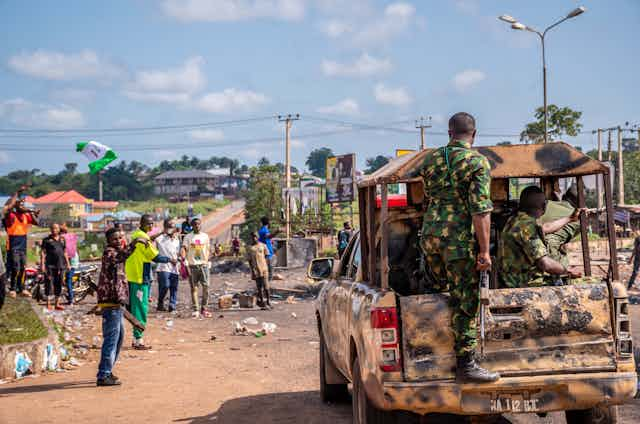
Presidential elections in Nigeria: alarm over violence and security likely to drive vote
PhD, Research Fellow at IFRA-Nigéria, University of Ibadan
Research associate NigeriaWatch & IFRA-Nigeria, Institut de recherche pour le développement (IRD)

Disclosure statement
The authors do not work for, consult, own shares in or receive funding from any company or organisation that would benefit from this article, and have disclosed no relevant affiliations beyond their academic appointment.
Institut de Recherche pour le Développement (IRD) provides funding as a founding partner of The Conversation FR.
University of Ibadan provides support as an endorsing partner of The Conversation AFRICA.
View all partners
With Nigeria’s presidential elections slated for Saturday 25 February, the country’s independent electoral commission’s offices have suffered several attacks in recent weeks. Concerns over security have been such that its head, Mahmood Yakubu, expressed doubts on 9 January whether the elections could take place.
Already, in early November, the US embassy had decided to repatriate its “non-essential” diplomatic personnel from the federal capital, Abuja, following a security briefing that was kept confidential. The move prompted a good number of diplomats and businessmen to flee at the time. In turn, the Nigerian press’ reaction ranged from criticism of Washington to alarmist views about rising violence .
Security, once again, is at the heart of the political debate in Africa’s most populous country .
The three main candidates
Incumbent president Muhammadu Buhari, a retired general now in his 80s, was elected in 2015 and re-elected in 2019 on the twin promises of ending corruption and insecurity in the country.
His record in office is being defended by Bola Ahmed Tinubu, candidate of Buhari’s party, the All Progressive Congress (APC). Officially 70 years old, Tinubu is the former governor of Lagos (1999-2007), whose corruption cases made headlines in the 1990s. There are 18 candidates in total, and Tinubu’s main opponent is Abubakar Atiku, 76, of the People’s Democratic Party (PDP), in power between 1999 and 2015. For the first eight years of that period, Atiku was vice president. Peter Obi of the Labour Party, 61, has a measure of momentum and enjoys support among the younger generation, dubbed the “Obidient” . As they stand, the polls currently available don’t seem particularly reliable.
In Nigeria, there is an unspoken rule that a northern (predominantly Muslim) president should be succeeded by a southern (predominantly Christian) president. This alternation, which has been in place for 24 years, would mean that the president elected in 2023 would be from the south and Christian.
However, the southern candidate, Tinubu, is a Muslim, as are his main northern opponent, Atiku, and the current president, Buhari. Tinubu, has a Muslim running mate, forming a “Muslim-Muslim” ticket. Atiku, on the other hand, is running with a southern Christian. The candidacy of the southern Christian Peter Obi, whose running mate is Muslim, would look ideal on paper if he were not also Igbo, an ethnic group from the South-East (15 to 18% of the total population of the country), sometimes associated with the ex-secessionists of Biafra . How, then, will Nigerians react to this break with traditional patterns?
Lessons from past elections
Since independence in 1960 , Nigeria’s political history has been marked by alternating periods of “republican” rule and autocracies often installed through military coups. The current political system – the fourth republic – will have its seventh consecutive presidential election in February.
In Nigerian history, electoral periods tend to be marred by instability and violence. While the first election in 1999 was conducted peacefully, President Obasanjo’s re-election in 2003 was more eventful , with many observers describing it as fraudulent .
Between 2007 and 2022, there were more than 3,000 election-related deaths, according to Nigeria Watch . However, no pattern holds true from one election to the next . For example, in the 2007 elections which EU observers considered “unreliable” , the violence was mainly caused by intra-party disputes for resources and positions, particularly within the PDP. In 2011, more violence broke out after the vote , especially following the results obtained by then-incumbent president Goodluck Jonathan (PDP) in the north, which appeared to favour his opponent and future president, Muhammadu Buhari.
In 2015, Buhari’s victory as leader of the APC – whose broom logo embodies the ambition to clean up the country after 16 years of PDP rule – was also followed by violence, again in the north. The 2019 election was less violent, although local clashes took place. The election was then postponed due to delays in the delivery of election materials.
This year, the vote is expected to be partly electronic, which raises new challenges. With the country’s notoriously unreliable electrical system , polling stations will have to rely on petrol-powered generators. And given refined fuels are running short , it is possible that the 2023 election will be postponed .
Insecurity as a key issue
Alongside inflation and the cost of living, insecurity is one of the subjects most dealt with by the candidates of the various parties.
Kidnappings, robberies and other criminal acts are frequent, and hundreds of deaths per year are caused by terrorist violence in the north, conflicts over territorial resources in the centre, and oil in the south .
The three main candidates propose more or less the same thing: more police and military personnel, and more use of technology.
There are two problems with these proposals. First, the idea of increasing both numbers and budgets is not new. Under Buhari, the military budget has increased significantly , from 4 trillion to 16 trillion Naira (N), or about N30 billion, from the last year of Goodluck Jonathan’s five-year term to Buhari’s. However, this money have failed to materialise on the ground after middlemen diverted some of it .
Second, it is not even certain that increasing the number of police or military personnel will reduce insecurity. On the one hand, increasing the number of police officers will presumably lead to an increase in arrests and thus boost crime statistics. On the other hand, police officers and military personnel are among the first perpetrators of violence .
While police violence has long been decried, with almost every Nigerian having a personal story to tell, it has attracted particular attention in 2020. Faced with repeated and unpunished abuses by a police unit, Nigerian youths took to the streets, giving rise to the #EndSARS movement , named after the Special Anti-Robbery Squad (SARS). At least 200 protesters lost their lives to the cause of more peaceful forces, prompting the disbanding of the brigade.
As for the military, they have caused more deaths than the Boko Haram terrorists they’re tasked with fighting. According to Nigeria Watch , armed forces are responsible for 55% of the victims of the conflict spanning between 1 January 2007 and 31 December 2019. This is due to a lack of discernment in their actions, which are sometimes more akin to retaliation than targeted actions, as well as poorly thought out aerial bombing .
Corruption, the lack of training within the police, as well cooperation between the police and the military, partly explain the country’s critical security situation. It is not certain that boosting budgets or providing new equipment to these personnel will improve the situation.
What to expect from the 2023 elections?
The two main candidates, political veterans in their 70s, are not particularly popular. Nigerians seem resigned in advance, making abstention and apathy the likely winners of the election this year.
As the researcher Corentin Cohen reminds us, however, electoral violence in Nigeria is not limited to the election period itself . It can appear as early as the party primaries, and extend right through the proclamation of the results. Thus even if there is no pattern of electoral violence, the security situation will be closely watched at least until the transition at the end of May 2023.
This article was originally published in French
- The Conversation France
- Nigeria politics
- Nigeria elections
- Nigeria police
- Electoral violence

Sydney Horizon Educators – Faculty of Engineering (Targeted)

Dean, Faculty of Education

Lecturer in Indigenous Health (Identified)

Social Media Producer

PhD Scholarship

What’s the root cause of Nigeria’s economic crisis?
A general strike demanding higher wages brings Nigeria to a standstill.
Nigeria has Africa’s largest population and it’s one of the world’s top oil producers.
Yet the nation of more than 200 million people has struggled with corruption, economic mismanagement and a weak currency.
Keep reading
Gen z, social media helping fuel spiritual tourism in india, passengers to us government: air travel is getting worse, streaming giants challenge new canadian revenue-sharing rules, eu imposes tariffs of up to 38% on chinese electric vehicles.
A general strike this week is drawing attention to these challenges.
Union leaders want a higher minimum wage and blame recent reforms by President Bola Tinubu for worsening the situation.
But can a general strike that’s shut down the national electric grid and several airports force the government to change course on this issue?
Presenter: Cyril Vanier
Khalil Halilu – Chief executive officer of Nigeria’s National Agency for Science and Engineering Infrastructure
Amaka Anku – Head of the Africa practice of the Eurasia Group
Hamzat Lawal – Anti-corruption activist and founder of Connected Development, a civil society organisation
Challenges and Possibilities for Progress in Nigeria
Subscribe to africa in focus, olumide taiwo ot olumide taiwo former brookings expert.
May 17, 2010
The death of Nigerian President Umaru Musa Yar’Adua did not come as a shock to most Nigerians due to his prolonged illness. In memory of his brief presidency, Yar’Adua will be remembered most for his unyielding commitment to the rule of law and his personal transparency as a politician. These attributes are rare among the Nigerian political elite. As president-elect, he declared his financial assets and invited Nigerians to judge his pledge of transparency at the end of his elected term when he would once again declare his assets. His attempt to find a lasting solution to the crisis in the oil-producing Niger-Delta region produced an amnesty program that required militants to lay down their guns and embrace peace and development in their communities. After admitting flaws in the election that brought him the presidency, Yar’Adua immediately initiated an overhaul of the electoral process to ensure that Nigeria could conduct credible elections in the future. He removed the selectivity stain that previously clouded anti-corruption efforts. In a departure from his predecessor, Yar’Adua institutionalized efforts to fight corruption rather than build the efforts around an individual, although his efforts against corruption were overshadowed by noise from within and outside the country.
During his inaugural speech, the new Nigerian president, Dr. Goodluck Jonathan, affirmed his commitment to Yar’Adua’s legacy in the areas of transparent governance, electoral reform, peace and development of the Niger Delta, security of life and property around the country, and the fight against corruption. Since the return of democratic governance to Nigeria in May 1999, elected presidents have tended to live up to their promises. A comparison of the last two presidents’ inaugural speeches and their subsequent achievements not only support this but also provides a basis for confidence in the new president.
Jonathan has learned important governing lessons from the various crises and challenges of democratic governance during his tenure as a deputy governor, then as governor of his home state before becoming vice president in May 2007. While these experiences are invaluable, it is also important that, as president, Jonathan seizes this opportunity to put Nigeria back on the path of rapid progress by devising fresh approaches to tackling the country’s growth and development problems.
Good Governance and Electoral Reforms
President Jonathan has taken some steps to demonstrate his commitment to good governance. He declared his financial assets back in 2007, and has included more people with either good knowledge of the country or proven managerial skills in his cabinet. While these were good steps, the problem of political patronage remains the bane of political and economic progress in Nigeria. Although the leadership crisis that gripped the country following the former president’s illness is partly attributable to weakness in the constitution regarding succession of power, it is to a greater extent a reflection of the strength of political patronage. Going forward, the president needs to establish new standards regarding who should do business with government and how government business should be run. Some of the steps taken by the Obama administration in the U.S. could provide guidance in this respect. On electoral reforms, he has taken some bold steps by removing the controversial chairman of the electoral commission. He should continue to engage the Judicial Council in the reforms and ensure that credible electoral officers are appointed, while ensuring the independence of the electoral commission. He also needs to ensure that the Economic and Financial Crime Commission (EFCC) becomes an institution that operates independently of the presidency subject to the rule of law.
Peace and Development of the Niger-Delta
The crisis in the Niger Delta has festered over more than two decades. The late president had already initiated an amnesty program to tackle the issue. Moving forward on this agenda requires a critical look at the historically important issues. Although the Movement for Emancipation of the Niger Delta (MEND) claimed that their struggle was borne out of total neglect of the Niger Delta areas, insiders would say that the crisis was more a result of the loss of confidence and trust by the youth in their political leaders. First, the federal government did not make good on its plan to compensate the indigenes for land appropriated for oil exploration. Second, monetary compensations by the oil companies to the communities through their leaders are often misappropriated. The youth reacted by attacking the homes and properties of community leaders. After cycles of infighting and having realized their approach was not fruitful, the youth changed their strategy and resorted to demanding compensation directly from the oil companies by taking hostages and demanding ransoms.
The Niger Delta Development Commission (NDDC), which was established about a decade ago to develop those areas, has made minimal impact primarily due to internal conflicts among its members. Members from different states and ethnic groups would prefer to appropriate most of the funds and projects for the benefit of their own respective areas. The absence of tangible impact by the commission remains a rallying point for militant youth to return to hostage-taking. As an indigene and former governor of a member state of the Niger Delta, the acting president needs to demonstrate that he has the knowledge, executive power and the political will to implement the terms of the amnesty program. Although he has recently appointed a new minister of the Niger Delta, there is a pressing need to restructure the NDDC in order to fasten the pace of development efforts. Jonathan could consider appointing a trusted Nigerian non-indigene of the Niger Delta area as chair of the governing board in order to break the current and potential stalemate in the commission’s decision process.
Security Issues around the Country
The crisis in Jos, Plateau State and similar crises in other parts of Nigeria provide lessons in the handling the country’s security matters. However, the lessons would be lost if the causes of these security crisis are not thoroughly examined. The Jos crisis began as an ethno-political one, but has recently assumed a dangerous religious dimension. The crisis started in 1996 during election for chairmanship of the Jos North local government. The new council was created by the Ibrahim Babangida administration in 1994 and governed by an appointed chairman for the first two years during which there were no crises. The area is populated by indigenous people and immigrant settlers. Since the settlers have outnumbered the indigenes over the years, the council election was won by a representative of the immigrant Hausa ethnic group, the majority population group in the council area. The outcome was not acceptable to the indigenes who felt entitled to the office. Since then, the battle for control of the local government has generated unrest on a recurring basis. The crisis assumed a religious dimension since the immigrant Hausas are Muslims and the indigenes are predominantly Christians. Other ethnic groups have become victims of the intermittent crisis either accidentally or by taking sides with the two groups based on religious affiliations.
Fundamentally, the Jos crisis can easily be replicated in other parts of the country as long as there are grounds for rivalry for resource control, particularly along ethnic lines. The main lesson learned is that governance by appointed administrators who are typically from outside the council area has worked better for peace and development. While this is at odds with the principles of democratic governance, the model provides clues as to how to solve the crisis. The government has always dealt with this and other crises on a post-mortem basis by setting up committees of inquiry. It is time to switch from the committee-of-inquiry approach to investing in more proactive domestic intelligence gathering system. Every crisis-in-waiting can be averted with little additional investment in the intelligence apparatus. Nigeria has the manpower to achieve this goal; there are people with deep knowledge of the history of every potential trouble area that would be happy to be part of the process.
Sound and Long-Term Public Institutions
The major problems confronting development in Nigeria are rooted in socio-cultural composition. The society consists of distinct and numerous communal groups, extended families and lineages, clans and ethnic groups, which have served to sustain livelihoods during years of bad governance, unemployment, deprivation and financial insecurity. As a result, these groups have transformed into solidarity groups, the welfare of which has assumed greater importance than the welfare of the larger society. This explains why female relatives of a Nigerian politician ordered to be arrested for corruption are willing to strip naked in protest. A Nigerian politician who holds public office is expected to use the country’s resources first and foremost for the benefit of his or her cultural, familial, ethnic or religious group. Instead of hard work on the farm or other productive enterprises, politics and political patronage have turned out as the most productive private investments and the platform for achieving the “Nigerian” dream.
For Nigeria to move forward in a sustainable way, it is imperative to strengthen public institutions, including law enforcement and social security institutions. The parliament needs to take seriously the issue of retirement benefits for politicians in every part of the county. There is urgent need for viable debate on how to eliminate the “fear of the unknown” that is the leading driver of corruption. If necessary, new institutions should be creatively designed with two objectives in mind. First, they must have the potential to weaken group solidarity. Second, they should provide Nigerian citizens some sense of ownership of the larger society in the country. It is also time to start investing in the collection of rich data that can provide the necessary information for development planning and robust policy analysis. The current depth of data collection efforts is anything but commendable.
The 2011 Presidential Election
President Goodluck Jonathan should not make participation in the 2011 presidential election a do-or-die affair. He should rather focus on building on the legacy of his late friend and predecessor Umaru Musa Yar’Adua. He has the support of various interest groups and citizens from across the country behind him. He should seize the moment and pursue the goals he promised in order move the country onto a path of sustainable development. If Jonathan decides to run in the 2011 presidential election and wins, it would be good news for the country since it guarantees continuity in his programs and policies. If instead he decides to just complete the tenure of the Yar’Adua administration, then he can focus more energy into his plans and supervise a credible election later this year. Either way, it is a win-win situation for the country.
Global Economy and Development
Sub-Saharan Africa
Africa Growth Initiative
Amy Liu, Chris Meserole, Molly E. Reynolds, Rashawn Ray, Keon L. Gilbert, Carol Graham, Richard G. Frank, Jenny Schuetz, Tonantzin Carmona, Glenn D. Rudebusch, John W. McArthur
February 6, 2023
William A. Galston, David Dollar
November 15, 2022
Fiona Hill, John Haltiwanger
July 16, 2022
Home — Essay Samples — Geography & Travel — Africa — Nigeria
Essays on Nigeria
Nigeria is a country with a rich and diverse history, culture, and economy. With its large population, diverse ethnic groups, and abundant natural resources, Nigeria offers a wide range of essay topics to explore. Whether you are interested in politics, economics, culture, or history, there are countless fascinating topics to delve into when writing about Nigeria. In this article, we will provide a comprehensive list of Nigeria essay topics, along with some tips on choosing the right topic for your essay.
The Importance of the Topic
Writing about Nigeria is important for several reasons. First, Nigeria is the most populous country in Africa and has a significant impact on the continent's politics, economy, and culture. Therefore, understanding Nigeria is crucial for anyone interested in African affairs. Additionally, Nigeria's history and culture are rich and complex, making it an intriguing subject for study and exploration. By writing about Nigeria, you can gain a deeper understanding of the country and its people, as well as contribute to the scholarly discourse on African studies.
Advice on Choosing a Topic
When choosing a topic for your Nigeria essay, it's important to consider your interests, as well as the requirements of the assignment. If you are passionate about politics, you might consider writing about Nigeria's democratic system, the role of political parties, or the impact of corruption on governance. If you are interested in economics, you could explore topics such as Nigeria's oil industry, the impact of globalization on the Nigerian economy, or the challenges of economic development. For those interested in culture and history, there are numerous topics to choose from, including traditional Nigerian music and dance, the history of colonialism in Nigeria, or the impact of globalization on Nigerian traditions. Ultimately, the best topic for your essay is one that aligns with your interests and expertise, while also allowing you to explore new ideas and perspectives.
Nigeria offers a wealth of essay topics to explore, ranging from politics and economics to culture and history. By writing about Nigeria, you can gain a deeper understanding of this diverse and dynamic country, while also contributing to the scholarly discourse on African studies. When choosing a topic for your Nigeria essay, it's important to consider your interests and the requirements of the assignment, in order to select a topic that is both engaging and academically rigorous. Whether you are interested in exploring Nigeria's political landscape, economy, culture, or history, there is no shortage of fascinating topics to delve into when writing about Nigeria.
Geo-political Review of Nigeria
Nigeria: the most crowded nation in africa, made-to-order essay as fast as you need it.
Each essay is customized to cater to your unique preferences
+ experts online
Women and Property Inheritance in Nigeria
Influence of colonialism on nigeria, business ideas for women, nigeria’s democracy in the era of fake news, let us write you an essay from scratch.
- 450+ experts on 30 subjects ready to help
- Custom essay delivered in as few as 3 hours
The National Health Policy of Nigeria
Exploring social innovation models and impact in nigeria, review of power reforms in nigeria, power reforms in nigeria, get a personalized essay in under 3 hours.
Expert-written essays crafted with your exact needs in mind
Review of Nigerian Power Reform
Why 2011, 2015 and eventually 2019 general election are history makers in nigeria, best vacations in nigeria, prisoners of conscience in nigeria, relations between china and nigeria, lost virtues in my country, pre-colonial and post-colonial challenges of motherhood as illustrated in joys of motherhood, overview of the political system in nigeria, small arms proliferation and its national security implications in nigeria,, importance of ajaokuta to the industrialization of nigeria, the independent national electoral commission (inec), fatherly role in african politics, an analysis of distinct nature of the urhobo people in regards to marriage and family life, the scales of the golden fish, lost at the sea, the impact of the film "merry men: the real yoruba demons" in nigerians, democracy in nigeria & india & effects of colonial experience on these countries, effects of colonialism in africa: nigeria and the congo, the main aims of the author in "things fall apart", nigeria vs western capitalist society as potrayed in things fall apart and the joys of motherhood, assessing the status of ergonomics and the health implications in an organization in nigeria, relevant topics.
- Philippines
By clicking “Check Writers’ Offers”, you agree to our terms of service and privacy policy . We’ll occasionally send you promo and account related email
No need to pay just yet!
We use cookies to personalyze your web-site experience. By continuing we’ll assume you board with our cookie policy .
- Instructions Followed To The Letter
- Deadlines Met At Every Stage
- Unique And Plagiarism Free

Essay on Nigeria My Country
Students are often asked to write an essay on Nigeria My Country in their schools and colleges. And if you’re also looking for the same, we have created 100-word, 250-word, and 500-word essays on the topic.
Let’s take a look…
100 Words Essay on Nigeria My Country
Introduction to nigeria.
Nigeria is a country in West Africa. It is known for its rich culture and many languages. The land has forests, mountains, and rivers. Many people live in Nigeria, making it Africa’s most populated country.
Nigerian Culture
The culture in Nigeria is colorful. People enjoy music, dance, and art. They celebrate festivals with joy. Clothing is often bright and beautiful. Nigerian food is tasty and includes rice, soups, and spices.
Places in Nigeria
Nigeria has exciting places to see. There are big cities like Lagos and natural spots like the Zuma Rock. Visitors like to see the wildlife and markets too.
Nigeria faces some problems. Not all children can go to school, and keeping the environment clean is tough. Leaders are working to solve these issues.
Nigeria is a country with friendly people and a strong spirit. It is full of life and has a future full of promise. It is a place many call home with pride.
250 Words Essay on Nigeria My Country
Nigeria is a country in West Africa. It’s known for its colorful culture, rich history, and natural beauty. With over 200 million people, it’s the most populous country in Africa and the seventh in the world.
Land and Nature
The land in Nigeria is very diverse. There are sandy beaches, large rivers, and even forests. The country also has a lot of wildlife, including elephants and lions. Nigeria’s weather is mostly hot since it’s close to the equator, but it also has rainy and dry seasons.
Culture and People
Nigeria is home to many different groups of people. Each group has its own language, traditions, and festivals. Music and dance are very important in Nigerian culture. The country is famous for its Nollywood film industry, which is one of the largest in the world.
Nigeria has a lot of natural resources like oil and gas. These resources play a big role in its economy. Agriculture is also important; many people farm products like cocoa and peanuts.
Nigeria faces some challenges, such as making sure everyone has enough food and access to education. The country is working to solve these problems and make life better for its people.
500 Words Essay on Nigeria My Country
Nigeria is a country located in West Africa. It is known for its rich history, diverse cultures, and natural resources. With over 200 million people, Nigeria is the most populous country in Africa and the seventh most populous in the world. The land is full of life and color, with many languages spoken and various traditions practiced.
Geography and Climate
The country has a varied landscape that includes beaches, mountains, forests, and deserts. The climate is tropical, with rainy and dry seasons that change depending on the area. The southern part of Nigeria is mostly wet and green, while the north can be hot and dry. This makes Nigeria home to a wide range of plants and animals, some of which are found nowhere else on Earth.
Nigeria’s culture is a tapestry of the many ethnic groups that live there. The country has over 250 ethnic groups, with the Hausa, Igbo, and Yoruba being the largest. Each group has its own customs, language, and way of life. Music and dance are important in Nigerian culture, with traditional beats like Afrobeat and Highlife being popular. Nigerian movies, known as Nollywood, are famous across Africa and tell stories that reflect the lives of the people.
Nigerian food is as diverse as its people. Dishes are often made with rice, beans, and yams, and are seasoned with spices that make them flavorful. Some popular foods include jollof rice, a spicy dish made with tomatoes and rice, and suya, which is grilled meat with a tasty spice rub. These foods are not just tasty but also a way to bring people together, as meals are a time for family and friends to share stories and enjoy each other’s company.
Nigeria has a growing economy that is one of the largest in Africa. It is rich in resources like oil and natural gas, which are important for the country’s wealth. Agriculture is also a key part of the economy, with many people working in farming to grow crops like cocoa, peanuts, and palm oil. Nigeria’s markets are full of life, with people buying and selling goods every day.
Nigeria is a country with a heart full of rhythm and a spirit that shines. Its landscapes are breathtaking, its cultures are vibrant, and its people are strong and resilient. Even with the difficulties it faces, Nigeria continues to move forward, building a future that honors its rich past and looks ahead with hope. For many Nigerians, their homeland is more than just a place on the map—it is a part of who they are.
That’s it! I hope the essay helped you.
If you’re looking for more, here are essays on other interesting topics:
Happy studying!
Leave a Reply Cancel reply
Your email address will not be published. Required fields are marked *

Cause of Corruption in Nigeria and Solution of the Problem
Cause of corruption in nigeria: problem statement, essay on the problems of nigeria: discussion, cause of corruption in nigeria: analysis, corruption in nigeria and solution recommendations, essay on the problems of nigeria: conclusion.
Corruption is one of the major causes of underdevelopment in various countries across the world. The lack of integrity and honesty in the use of public offices and resources for individual gain has led to numerous development challenges in various countries (Smith, 2010). Studies have established that most countries, especially in Africa continue to suffer the effects of underdevelopment due to corruption. Even in the contemporary world of increased democracy, corruption always emerges as the number one hindrance to development. One such country that has lagged behind in terms of development because of corruption is the federal republic of Nigeria (Ikita, 2014).
The West African republic, which got its independence from Britain in 1960 and currently the most populous country in the continent, is in a deeply rooted state of progressive putrefaction. Even after more than fifty years of independence, Nigeria still ranks among the most underdeveloped countries in the world (Smith, 2010). Political bribery and economic corruption are the two major ways in which public resources in Nigeria are abused by individuals in influential positions. Statistics show that over the last couple of years, the country had an average score of 25% in terms of addressing the challenge. The life expectancy in the country has also gone down to 51 years due to challenges related to corruption (Ikita, 2014). Experts argue that the problem is likely to deepen if the government and other relevant social institutions fail to make a timely intervention. Many people fear that the country might reach a point where people have to pay bribes in order to be secure.
Over the years, the challenge of corruption in Nigeria has worsened to the extent of various economic experts questioning the seriousness of the government in eradicating the problem (Okofar, 2014). These questions have been asked amid a tough stance taken by President Goodluck Jonathan as a warning to anyone caught for engaging in corrupt dealings. However, most Nigerians believe that the government is doing very little development as corruption has crippled the economy (Smith, 2010). For example, corruption among security agencies that ought to act as the custodians of the law is quite worrying. Police officers have made Nigerians, especially motorists to view corruption as something that was designed to be part of their life (Ikita, 2014). It is normal for them to bribe traffic police officers every time they are made to pull over even if they have no mistake.
Experts describe the corruption situation in Nigeria as a malady that affects everyone at both human and institutional levels. This means that corruption defines social, economic, political, and development structures in the country (Ikita, 2014). The challenge of development in Nigeria is characterized by elements such as poor infrastructure, a vibrant black market, electoral crimes, lack of power supply, and abuse of human rights among others (Smith, 2010).
Studies have established that a number of factors are responsible for corruption in the country. Weak institutions of governance are a major causative factor of bribery in the West African country (Ross, 2014). Experts argue that it is not possible to implement policies in a governance system where the custodians of law are the biggest violators. Most cases of corruption in the country are linked to politicians, police officers, and other powerful individuals in influential positions. Recently, the United States of America blocked more than $400 million in accounts held by Nigerian nationals accused of engaging in corruption. Reports indicate that part of the money belonged to Sani Abacha, who was the president of Nigeria in the 1990’s (Ross, 2014). This is a clear indication of a failed governance system coupled with irresponsible leadership. The leaders who are supposed to be eradicating the vice are the same ones behind its growth. The same thinking applies for the country’s police force, which ranks among the most corrupt public institutions in the country.
Another major cause of corruption in Nigeria is the public acceptance of the vice as part of their culture (Okofar, 2014). Experts argue that the people are responsible for encouraging corruption when they agree to pay for services they should be getting for free. Other notable causative factors of corruption in Nigeria include low wages, lack of legislation to fight corruption, poverty, scramble for resources, ineffective political processes, as well as lack of transparency and accountability in the public sector (Ross, 2014). Very little progress has been witnessed to date in the fight against corruption because the government is not doing anything to stop the problem from spreading further.
Some of the reasons as to why the fight against the vice has not succeeded in the country include insecurity of informants, lack of social movements to pressure the government, and lack of transparency in the government (Ikita, 2014). Other reasons include the lack of an inclusive governance system, nepotism, and irresponsible leadership among others. Studies have established that the beneficiaries of corruption in Nigeria are very few compared those who suffer the effects. The major beneficiaries are politicians, police officers, senior government officials, and influential business personalities. People who suffer from the effects of corruption are the citizens, most of whom are extremely poor (Ross, 2014). I think the persistent nature of this problem is due to the fact that the power of making decisions on matters such as this lies in the hands of few individuals who tend to abuse it.
Studies have established that most Nigerians fear for their future and that of subsequent generations if this vice is not wiped out of the society. The rate of development is quite low because there is no primary capital for investment. Experts argue that even though not everyone in Nigeria is corrupt, it is impossible to argue against the common perception that everyone in the country has to part with something to receive any service (Okoye, 2014). According to experts, waging the war against corruption in Nigeria requires a lot of cooperation and honest, especially from political leaders and other influential people in the society. The first recommendation is creating an independent anti corruption commission, which will have the power to deal with anyone suspected of being corrupt regardless of their position in government or society. Experts argue that the inability of such commissions to have their independence can compromise the ability to eliminate the vice due to political interference (Okoye, 2014). It is important to note that corruption is quite deep rooted in Nigeria. Therefore, the best point of tackling the challenge is by identifying and eliminating all the causative factors.
The second recommendation is the creation of public education programs geared towards educating the public on the challenge of corruption, its effects, and the best eradication methods (Okoye, 2014). Experts argue that the use of strategies such as advertisement in print and electronic media, billboards, as well as hand bills can be very effective in enlightening Nigerians about corruption. In addition, the experts argue that this kind of strategy should have a supporting legislation that should push people into reporting cases of corruption without fear of intimidation (Sherk, 2005). This kind of legislation can be effective if financial institutions get incorporated. If they notice any abnormal transactions, they should have the freedom to alert the relevant authorities in order to have the right actions taken (Sherk, 2005).
Other notable ways in which the government can fight corruption is by increasing levels of accountability and transparency, people’s involvement in governance, improving pay incentives, as well as fighting nepotism (Okoye, 2014). The government has a huge task of ensuring that people change their attitude and belief about corruption because it is their right to receive services in accordance with the country’s constitution. I also believe that equitable distribution of resources can play a crucial role in addressing the challenge of corruption. The reason for this is that people will not be forced to scramble for the few available resources through paying of bribes (Okofar, 2014). When everyone has enough, no one will be in a position to ask for bribes.
Corruption is a deep rooted problem that has compromised the development policy in Nigeria for a long time. The situation in the country is quite worrying, as people seem to have accepted the vice as part of their lives, and at the same time compromising the future of subsequent generations. The political, social, economic, and development structures of Nigeria are currently dependent on corruption. There is an urgent need for the government to develop effective strategies that will identify and eliminate various causative factors of the crime.
Ikita, P. (2014). Corruption in Nigeria, Not Just Boko Haram, Is At The Root of Violence .
Okofar, U. (2014). The Nigerian Government is a greater Threat to its People than Boko Haram .
Okoye, S.E. (2014). How to Tackle Corruption Effectively in Nigeria .
Ross, W. (2014). Is Nigeria Serious about Tackling Corruption?
Sherk, D.R. (2005). The Cultural Dimensions of Corruption: Reflections on Nigeria . New York: university press of America. Web.
Smith, D.J. (2010). A Culture of Corruption: Everyday Deception and Popular Discontent in Nigeria . New York: Princeton University Press.
Cite this paper
- Chicago (N-B)
- Chicago (A-D)
StudyCorgi. (2020, September 11). Cause of Corruption in Nigeria and Solution of the Problem. https://studycorgi.com/corruption-in-nigeria-causes-and-effects/
"Cause of Corruption in Nigeria and Solution of the Problem." StudyCorgi , 11 Sept. 2020, studycorgi.com/corruption-in-nigeria-causes-and-effects/.
StudyCorgi . (2020) 'Cause of Corruption in Nigeria and Solution of the Problem'. 11 September.
1. StudyCorgi . "Cause of Corruption in Nigeria and Solution of the Problem." September 11, 2020. https://studycorgi.com/corruption-in-nigeria-causes-and-effects/.
Bibliography
StudyCorgi . "Cause of Corruption in Nigeria and Solution of the Problem." September 11, 2020. https://studycorgi.com/corruption-in-nigeria-causes-and-effects/.
StudyCorgi . 2020. "Cause of Corruption in Nigeria and Solution of the Problem." September 11, 2020. https://studycorgi.com/corruption-in-nigeria-causes-and-effects/.
This paper, “Cause of Corruption in Nigeria and Solution of the Problem”, was written and voluntary submitted to our free essay database by a straight-A student. Please ensure you properly reference the paper if you're using it to write your assignment.
Before publication, the StudyCorgi editorial team proofread and checked the paper to make sure it meets the highest standards in terms of grammar, punctuation, style, fact accuracy, copyright issues, and inclusive language. Last updated: February 20, 2023 .
If you are the author of this paper and no longer wish to have it published on StudyCorgi, request the removal . Please use the “ Donate your paper ” form to submit an essay.
Watch CBS News
A look at international media coverage of the Biden-Trump debate
By Haley Ott
June 28, 2024 / 11:33 AM EDT / CBS News
London — The results of the presidential election in November will be important to U.S. allies and adversaries around the world, so there was interest worldwide in the debate between President Biden and former President Trump . Foreign media outlets' coverage of the debate can lend some insight into the priorities and viewpoints in other countries.
Here is a glimpse at how some international media covered Thursday night's debate.
United Kingdom: The Times of London and The Guardian
Three stories on the homepage of The Times of London, generally considered a right-leaning newspaper, were about the debate. One outlined key moments and spoke about Democrats' concern over President Biden's performance .
One was a commentary, and one was an explainer outlining whether it would be possible for the Democratic Party to replace Mr. Biden as its candidate before the election.
The Guardian, a left-leaning newspaper, ran multiple stories about the debate, focusing on Mr. Biden's performance and his resistance to calls for him to step down as the Democratic candidate. It also published an article outlining media reactions to the debate, with the headline: "'10 minutes to destroy a presidency': how US and global media reviewed the Biden-Trump debate."
France: Le Monde
France's Le Monde newspaper noted that President Biden was "raspy and sometimes halting" during the debate, and said Trump was "bombastic" and had "lashed out" with personal attacks.
Germany: Der Spiegel
In addition to a debate fact check article and an editorial, on its homepage, Der Spiegel ran a story with reactions from German politicians.
"This night will not be forgotten. The Democrats must now change course," Norbert Röttgen, a foreign affairs expert and lawmaker with the center-right Christian Democratic Union party, told the paper.
Left-leaning German member of the European Parliament Marie-Agnes Strack-Zimmermann was quoted as saying: "The Democrats must react immediately and put a new candidate into the race. The fact that a man like Trump could become president again because the Democrats are not in a position to put up a strong candidate against him would be a historic tragedy that the whole world would feel."
"Joe Biden presented many facts unclearly and was sometimes difficult to understand linguistically," Michael Link, of the liberal FDP party, was quoted as saying. "That's a shame, because unlike Trump, he presented many important facts. But he didn't get his message across enough."
Ukraine: Kyiv Post
In Ukraine — which will need continued support from the U.S. in its ongoing fight against Russia's invasion no matter who wins in November — the only coverage of the debate on the Kyiv Post was an editorial analyzing other media reaction to the debate.
It said that neither President Biden nor Trump had articulated a stance on the war in Ukraine that was different from either of their previously stated positions.
Russia: RIA Novosti
The lead story on the homepage of Russia's state-run RIA Novosti news agency was about the French parliamentary elections, but there was also coverage of the U.S. presidential debate.
That story, in addition to touching on certain topics from the debate, led with a line about Democratic officials looking to potentially replace President Biden as the party's candidate.
Israel: Haaretz
The lead story on the Haaretz website was an editorial calling the debate a "sad night for America."
The coverage of the event focused on what both candidates had to say about the war between Israel and Hamas . It said the fact the topic came up in the first 35 minutes of the debate "demonstrates how abnormally significant Israel will be in the upcoming election."
South Korea: Yonhap News Agency
Yonhap's coverage called the debate "rancorous," but did not touch on President Biden's performance, apart from one mention of his "hoarse voice."
The story on its website homepage focused on the topics covered in the debate, including immigration, inflation and foreign policy.
Iran: Iran Republic News Agency (IRNA)
Iran's state run news agency, IRNA, did not appear to cover the U.S. debate at all. Iran is having its own presidential election , which dominated the headlines.
Nigeria: Punch Newspaper
Nigeria's Punch Newspaper covered the debate on its front page using AFP News agency reporting. The headline on the article was: "Biden struggles in fiery debate with Trump."
Mexico: El Universal
El Universal's coverage focused on Mr. Biden's performance and Trump's emphasis on immigration .
Labeling Trump the winner, the newspaper said Mr. Biden made "erratic statements" and had a "hoarse, weak voice."
It went through a number of issues covered by the two politicians in the debate, and said Trump had told numerous lies and demonstrated that his strategy was to undermine his opponent's competence and paint immigration as a major issue facing the U.S.
- Donald Trump
- Foreign Policy
Haley Ott is the CBS News Digital international reporter, based in the CBS News London bureau.
More from CBS News

Far-right Trump ally Nigel Farage wins a seat in the U.K. Parliament
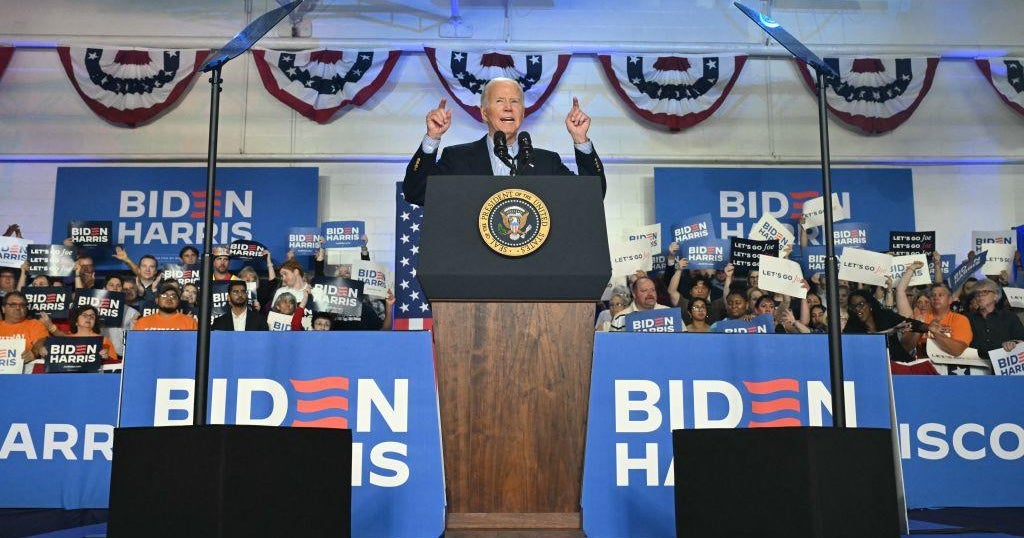
Biden defies calls to drop out: "Completely ruling that out"
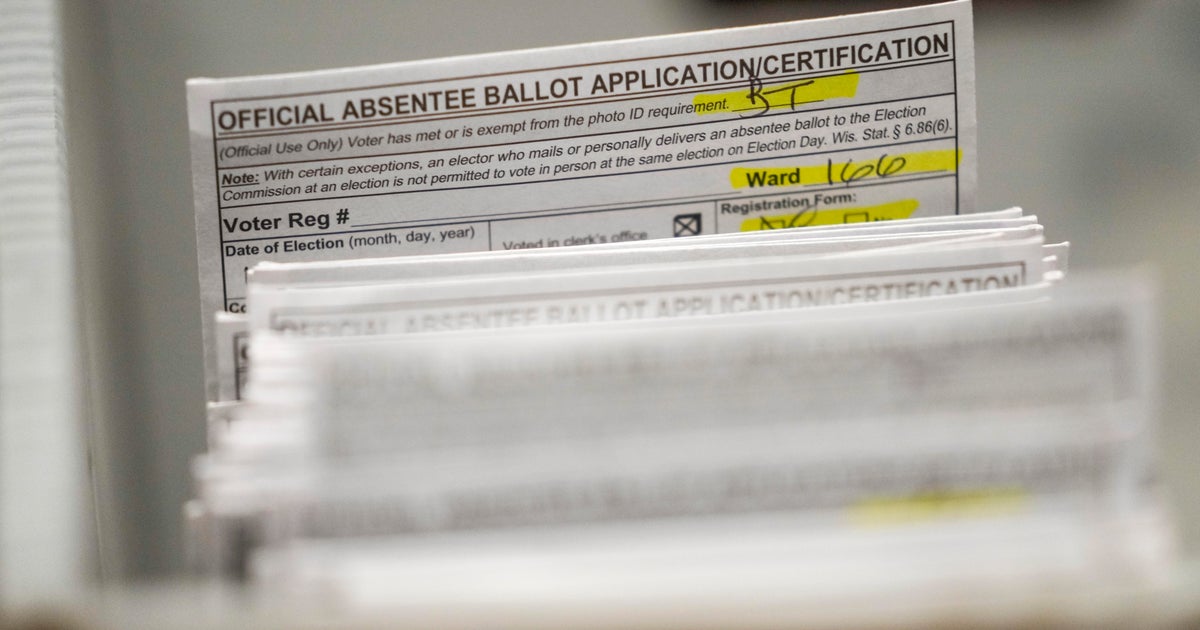
Wisconsin Supreme Court allows expanded use of ballot drop boxes

Biden tells ABC News his debate was a "bad episode," says he was "exhausted"
- Share full article
Advertisement
Supported by
Guest Essay
The Struggles of President Biden and the Truth About Aging

By Rachael Bedard
Dr. Bedard is a physician and writes about medicine and criminal justice.
Last week, President Biden tried to acknowledge and mitigate concerns about his capacity to stay on in the most important job in the world. “I know I’m not a young man, to state the obvious,” he said after a disastrous debate against Donald Trump. “I don’t walk as easy as I used to. I don’t speak as smoothly as I used to. I don’t debate as well as I used to.” But, the president went on, “I know, like millions of Americans know, when you get knocked down, you get back up.”
He was asking Americans to see themselves in him and to recognize his debate performance as both an aberration from and a continuation of who he has always been: a person who may suffer and stumble but whose ambition, commitment and confidence in himself have provided a backstop of resilience against insult and injury.
Reporters and Mr. Biden’s biographers have been reflecting over the past week about the severity and nature of his condition and on whether they missed signs or were duped. Americans are suddenly engaged in a speculative conversation about whether the president is physically and mentally fit to lead the country and whether they can trust his self-assessment. What would it mean for a person to “get back up” who also can’t walk, speak or debate with the ease he once did? And how to make sense of his appearance at the debate and the stories that have emerged since about lapses of memory, naps during the day and occasional bouts of confusion?
I’m a geriatrician, a physician whose specialty is the care of older adults. I watched the debate and saw what other viewers saw: a president valiantly trying to stand up for his record and for his nation but who seemed to have declined precipitously since the State of the Union address he gave only a few months earlier.
As a country, we are not having a complete or accurate discussion of age-related debility. I know no specifics — and won’t speculate here — about Mr. Biden’s clinical circumstances. But in the face of so much confused conjecture, I think it’s important to untangle some of the misunderstanding around what age-related decline may portend. Doing so requires understanding a well-characterized but underrecognized concept: clinical frailty.
As we age, everyone accumulates wear and tear, illness and stress. We can all expect to occasionally lose a night’s sleep, struggle with jet lag, catch a virus, trip and fall or experience side effects from medication. But for young and middle-aged people who are not chronically or seriously ill, these types of insults don’t usually change the way we function in the long term. This is not so for frail elders.
We are having trouble retrieving the article content.
Please enable JavaScript in your browser settings.
Thank you for your patience while we verify access. If you are in Reader mode please exit and log into your Times account, or subscribe for all of The Times.
Thank you for your patience while we verify access.
Already a subscriber? Log in .
Want all of The Times? Subscribe .

IMAGES
VIDEO
COMMENTS
Corruption has been a big issue in Nigeria for quite some time. Political leaders have a history of engaging in corrupt practices. Diseases like HIV/AIDS have also been a major problem that has cost the government billions of dollars to address. Currently, 3% of the population is between the ages of 15 and 64.
Nigeria is perceived in the 2020 Transparency International Corruption Perception Index as a highly corrupt country with a score of 25/100 while its corruption ranking increased from 146 in 2019 to 149 in 2020 out of 180 countries surveyed. While President Muhammadu Buhari won the 2015 election on his promise to fight insecurity and corruption ...
In 2023, the Network of Nigerian Facilitators (NNF) helped the Kaduna State peacebuilding institutions negotiate, draft and implement a peace agreement between local groups to resolve a long-standing and violent communal conflict. The agreement built on a 2019 peace agreement also supported by the NNF to resolve a cross-border conflict involving many of the same groups in neighboring Plateau ...
The other problems follow in descending order, with drug abuse and environmental degradation placing at the bottom of Nigeria's problems. In the 2019 data however, a few things changed.
Despite these problems, Nigeria has made substantial socio-economic progress, at least since 1999 when it returned to democracy after decades of military rule. It is also a country with huge ...
Causes of insecurity in Nigeria. 2. Poverty: The failure of Nigerian governments to fix the challenges of poverty and the unequal distribution of wealth among ethnic nationalities is a major contributor to the country's insecurity. When you have a poor population, you have a serious insecurity problem.
Despite its problems, Nigeria is a supremely vibrant country, one with the potential to become the United States' most important African political ally and trading partner. In their imagination ...
Option A4 has been said to be unconventional but so is the problem with Nigeria. It makes sense that an unconventional problem should be attacked and decimated with an unconventional weapon especially when every conventional weapon has failed over the span of almost 3 decades. It is time to amend the electoral laws of Nigeria to reintroduce the ...
The insecurity problem in Nigeria however goes beyond insurgency alone. By its standard definition, Miller and King (2005) describes insurgency as a para-military, guerilla or non-violent uprising directed against a state or holders of state powers from within the state in order to achieve political objectives.
With Nigeria's presidential elections slated for Saturday 25 February, the country's independent electoral commission's offices have suffered several attacks in recent weeks. Concerns over ...
Abstract. Nigeria and the world over, everybody and every nation clamor for democracy now. A development informed by the curiosity for greater freedom and right to liberty which everyone yearns ...
into private pockets. (Usman 2016) Corruption is at the root of many of Nigeria's problems in totality. Corruption takes many forms and infiltrates all political institutions and economic sectors. Transparency International deemed Nigeria one of the most corrupt nations in the world, ranking as 144th in Corruption
Nigeria has Africa's largest population and it's one of the world's top oil producers. Yet the nation of more than 200 million people has struggled with corruption, economic mismanagement ...
The Inspector-General of Police, Ibrahim Idris, disclosed that the kidnapper collected about $6 million as ransom from his kidnapping business. Evan has houses in Nigeria and Ghana, and he made his fortune from kidnapping. The arrest of Evans the kidnapper is the biggest kidnapping news in Nigeria in 2017.
Either way, it is a win-win situation for the country. Nigeria has sustained many challenges, most recently the death of President Umaru Musa Yar'Adua. Olumide Taiwo discusses the president's ...
eywords: Democracy, Challenges, Prospects, Nigeria1. Introduction The advent of British rule in what later became Nigeria saw the introduction of modern democracy which mainly began from the 1922 to. 963 Constitutions before the military eventually intervened in 1966. The military intervention swept under the carpet many of what may be termed ...
Influence of Colonialism on Nigeria. 5 pages / 2202 words. Colonialism is a consistent theme within the history of Africa. It laces through the formative tapestry of the majority of African states today including Nigeria. Lagos was invaded by British forces in 1851 and formally annexed in 1861.
Nigeria faces some problems. Not all children can go to school, and keeping the environment clean is tough. Leaders are working to solve these issues. Conclusion. ... 500 Words Essay on Nigeria My Country Introduction to Nigeria. Nigeria is a country located in West Africa. It is known for its rich history, diverse cultures, and natural resources.
June 11, 2024. Nigeria is facing its worst economic crisis in decades, with skyrocketing inflation, a national currency in free-fall and millions of people struggling to buy food. Only two years ...
Essay on the Problems of Nigeria: Discussion. Over the years, the challenge of corruption in Nigeria has worsened to the extent of various economic experts questioning the seriousness of the government in eradicating the problem (Okofar, 2014). These questions have been asked amid a tough stance taken by President Goodluck Jonathan as a warning ...
1. Inadequate budgetary allocation/ under funding: Nigeria is one of the country that is yet to allocate 26 percent of her budgetary allocation to education as recommended by the United Nations (UNESCO). This goes a long way to affect education in the country. One of the major problems facing Nigeria education is under funding. 2.
Nigeria: Punch Newspaper. Nigeria's Punch Newspaper covered the debate on its front page using AFP News agency reporting. The headline on the article was: "Biden struggles in fiery debate with Trump."
In fact, if anything, this latest round feels tame—at least on screen. In The Idea of You, Hayes' age has been upped from 20 to 26. Hathaway, meanwhile, could pass for a 30-year-old. The sex ...
The result of that effort is seven pre-press papers - all available here - that DARPA believes demonstrate it "is plausible that quantum computers will provide advantage for economically valuable applications in certain chemistry, quantum materials, and materials science applications.". But the news isn't all good. One of the papers is titled "Feasibility of accelerating incompressible ...
Guest Essay. Gettysburg's Lost Cause Problem. July 4, 2024. Credit... Alana Perino. ... they are emblematic of the pervasive problem of both-sides-ism at the park and in Civil War education more ...
It's true that the trajectory of aging varies from person to person. Biden is 81, and former President Donald Trump is 78. Both have already lived longer than the average American male lifespan ...
Since October, the cost of moving a 40-foot shipping container from China to Europe has increased to about $7,000, from an average of roughly $1,200, according to data compiled by Xeneta, a cargo ...
"Mid" is an obvious example. I don't think it even qualifies as teenage slang anymore — it's too useful and, by now, too widespread. In my son's usage, things that are mid are things ...
Unfortunately, Democrats, once inclined to ignore the pundits and trust the data, have now soured on public opinion surveys. Contrary to what many of them — including people in the White House ...
Last week, President Biden tried to acknowledge and mitigate concerns about his capacity to stay on in the most important job in the world. "I know I'm not a young man, to state the obvious ...